#terminal interface monitor
Explore tagged Tumblr posts
Text

Synertek 6530-004 RRIOT from the 35th week of 1979.
RRIOT stands for RAM ROM Input Output Timer, a combination chip with everything but the CPU crammed in there. It's not high-performance, but it's a compact companion to a 6502. The -004 suffix indicates that the ROM contains the Terminal Interface Monitor on board. It only has 64 bytes of RAM on board, so more is typically suggested to do anything of consequence, but it makes up for that by having a pair of 8-bit bidirectional data ports, and internal timers to setup interrupts.
21 notes
·
View notes
Text
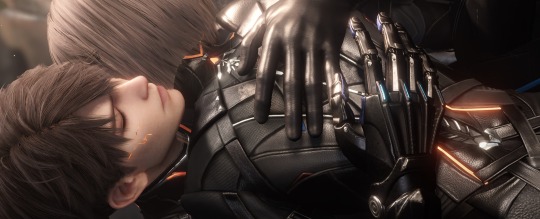
THE TERMINATOR'S CURSE. (spinoff to THE COLONEL SERIES)

in this new world, technological loneliness is combated with AI Companions—synthetic partners modeled from memories, faces, and behaviors of any chosen individual. the companions are coded to serve, to soothe, to simulate love and comfort. Caleb could’ve chosen anyone. his wife. a colleague. a stranger... but he chose you.
➤ pairings. caleb, fem!reader
➤ genre. angst, sci-fi dystopia, cyberpunk au, 18+
➤ tags. resurrected!caleb, android!reader, non mc!reader, ooc, artificial planet, post-war setting, grief, emotional isolation, unrequited love, government corruption, techno-ethics, identity crisis, body horror, memory & emotional manipulation, artificial intelligence, obsession, trauma, hallucinations, exploitation, violence, blood, injury, death, smut (dubcon undertones due to power imbalance and programming, grief sex, non-traditional consent dynamics), themes of artificial autonomy, loss of agency, unethical experimentation, references to past sexual assault (non-explicit, not from Caleb). themes contain disturbing material and morally gray dynamics—reader discretion is strongly advised.
➤ notes. 12.2k wc. heavily based on the movies subservience and passengers with inspirations also taken from black mirror. i have consumed nothing but sci-fi for the past 2 weeks my brain is so fried :’D reblogs/comments are highly appreciated!

BEFORE YOU BEGIN ! this fic serves as a spinoff to the THE COLONEL SERIES: THE COLONEL’S KEEPER and THE COLONEL’S SAINT. while the series can be read as a standalone, this spinoff remains canon to the overarching universe. for deeper context and background, it’s highly recommended to read the first two fics in the series.
The first sound was breath.
“Hngh…”
It was shallow, labored like air scraping against rusted metal. He mumbled something under his breath after—nothing intelligible, just remnants of an old dream, or perhaps a memory. His eyelids twitched, lashes damp with condensation. To him, the world was blurred behind frosted glass. To those outside, rows of stasis pods lined the silent room, each one labeled, numbered, and cold to the touch.
Inside Pod No. 019 – Caleb Xia.
A faint drip… drip… echoed in the silence.
“…Y/N…?”
The heart monitor jumped. He lay there shirtless under sterile lighting, with electrodes still clinging to his temple. A machine next to him emitted a low, steady hum.
“…I’m sorry…”
And then, the hiss. The alarm beeped.
SYSTEM INTERFACE: Code Resurrection 7.1 successful. Subject X-02—viable. Cognitive activity: 63%. Motor function: stabilizing.
He opened his eyes fully, and the ceiling was not one he recognizes. It didn’t help that the air also smelled different. No gunpowder. No war. No earth.
As the hydraulics unsealed the chamber, steam also curled out like ghosts escaping a tomb. His body jerked forward with a sharp gasp, as if he was a drowning man breaking the surface. A thousand sensors detached from his skin as the pod opened with a sigh, revealing the man within—suspended in time, untouched by age. Skin pallid but preserved. A long time had passed, but Caleb still looked like the soldier who never made it home.
Only now, he was missing a piece of himself.
Instinctively, he examined his body and looked at his hands, his arm—no, a mechanical arm—attached to his shoulder that gleamed under the lights of the lab. It was obsidian-black metal with veins of circuitry pulsing faintly beneath its surface. The fingers on the robotic arm twitched as if following a command. It wasn’t human, certainly, but it moved with the memory of muscle.
“Haaah!” The pod’s internal lighting dimmed as Caleb coughed and sat up, dazed. A light flickered on above his head, and then came a clinical, feminine voice.
“Welcome back, Colonel Caleb Xia.”
A hologram appeared to life in front of his pod—seemingly an AI projection of a soft-featured, emotionless woman, cloaked in the stark white uniform of a medical technician. She flickered for a moment, stabilizing into a clear image.
“You are currently located in Skyhaven: Sector Delta, Bio-Resurrection Research Wing. Current Earth time: 52 years, 3 months, and 16 days since your recorded time of death.”
Caleb blinked hard, trying to breathe through the dizziness, trying to deduce whether or not he was dreaming or in the afterlife. His pulse raced.
“Resurrection successful. Neural reconstruction achieved on attempt #17. Arm reconstruction: synthetic. Systemic functions: stabilized. You are classified as Property-Level under the Skyhaven Initiative. Status: Experimental Proof of Viability.”
“What…” Caleb rasped, voice hoarse and dry for its years unused. “What the fuck are you talkin’ about?” Cough. Cough. “What hell did you do to me?”
The AI blinked slowly.
“Your remains were recovered post-crash, partially preserved in cryo-state due to glacial submersion. Reconstruction was authorized by the Skyhaven Council under classified wartime override protocols. Consent not required.”
Her tone didn’t change, as opposed to the rollercoaster ride that his emotions were going through. He was on the verge of becoming erratic, restrained only by the high-tech machine that contained him.
“Your consciousness has been digitally reinforced. You are now a composite of organic memory and neuro-augmented code. Welcome to Phase II: Reinstatement.”
Caleb’s breath hitched. His hand moved—his real hand—to grasp the edge of the pod. But the other, the artificial limb, buzzed faintly with phantom sensation. He looked down at it in searing pain, attempting to move the fingers slowly. The metal obeyed like muscle, and he found the sight odd and inconceivable.
And then he realized, he wasn’t just alive. He was engineered.
“Should you require assistance navigating post-stasis trauma, our Emotional Conditioning Division is available upon request,” the AI offered. “For now, please remain seated. Your guardian contact has been notified of your reanimation.”
He didn’t say a word.
“Lieutenant Commander Gideon is en route. Enjoy your new life!”
Then, the hologram vanished with a blink while Caleb sat in the quiet lab, jaw clenched, his left arm no longer bones and muscle and flesh. The cold still clung to him like frost, only reminding him of how much he hated the cold, ice, and depressing winter days. Suddenly, the glass door slid open with a soft chime.
“Well, shit. Thought I’d never see that scowl again,” came a deep, manly voice.
Caleb turned, still panting, to see a figure approaching. He was older, bearded, but familiar. Surely, the voice didn’t belong to another AI. It belonged to his friend, Gideon.
“Welcome to Skyhaven. Been waiting half a century,” Gideon muttered, stepping closer, his eyes scanning his colleague in awe. “They said it wouldn’t work. Took them years, you know? Dozens of failed uploads. But here you are.”
Caleb’s voice was still brittle. “I-I don’t…?”
“It’s okay, man.” His friend reassured. “In short, you’re alive. Again.”
A painful groan escaped Caleb’s lips as he tried to step out of the pod—his body, still feeling the muscle stiffness. “Should’ve let me stay dead.”
Gideon paused, a smirk forming on his lips. “We don’t let heroes die.”
“Heroes don’t crash jets on purpose.” The former colonel scoffed. “Gideon, why the fuck am I alive? How long has it been?”
“Fifty years, give or take,” answered Gideon. “You were damn near unrecognizable when we pulled you from the wreckage. But we figured—hell, why not try? You’re officially the first successful ‘reinstatement’ the Skyhaven project’s ever had.”
Caleb stared ahead for a beat before asking, out of nowhere, “...How old are you now?”
His friend shrugged. “I’m pushin’ forty, man. Not as lucky as you. Got my ChronoSync Implant a little too late.”
“Am I supposed to know what the hell that means?”
“An anti-aging chip of some sort. I had to apply for mine. Yours?” Gideon gestured towards the stasis pod that had Caleb in cryo-state for half a century. “That one’s government-grade.”
“I’m still twenty-five?” Caleb asked. No wonder his friend looked decades older when they were once the same age. “Fuck!”
Truthfully, Caleb’s head was spinning. Not just because of his reborn physical state that was still adjusting to his surroundings, but also with every information that was being given to him. One after another, they never seemed to end. He had questions, really. Many of them. But the overwhelmed him just didn’t know where to start first.
“Not all of us knew what you were planning that night.” Gideon suddenly brought up, quieter now. “But she did, didn’t she?”
It took a minute before Caleb could recall. Right, the memory before the crash. You, demanding that he die. Him, hugging you for one last time. Your crying face when you said you wanted him gone. Your trembling voice when he said all he wanted to do was protect you. The images surged back in sharp, stuttering flashes like a reel of film catching fire.
“I know you’re curious… And good news is, she lived a long life,” added Gideon, informatively. “She continued to serve as a pediatric nurse, married that other friend of yours, Dr. Zayne. They never had kids, though. I heard she had trouble bearing one after… you know, what happened in the enemy territory. She died of old age just last winter. Had a peaceful end. You’d be glad to know that.”
A muscle in Caleb’s jaw twitched. His hands—his heart—clenched. “I don’t want to be alive for this.”
“She visited your wife’s grave once,” Gideon said. “I told her there was nothing to bury for yours. I lied, of course.”
Caleb closed his eyes, his breath shaky. “So, what now? You wake me up just to remind me I don’t belong anywhere?”
“Well, you belong here,” highlighted his friend, nodding to the lab, to the city beyond the glass wall. “Earth’s barely livable after the war. The air’s poisoned. Skyhaven is humanity’s future now. You’re the living proof that everything is possible with advanced technology.”
Caleb’s laugh was empty. “Tell me I’m fuckin’ dreaming. I’d rather be dead again. Living is against my will!”
“Too late. Your body belongs to the Federation now,” Gideon replied, “You’re Subject X-02—the proof of concept for Skyhaven’s immortality program. Every billionaire on dying Earth wants what you’ve got now.”
Outside the window, Skyhaven stretched like a dome with its perfect city constructed atop a dying world’s last hope. Artificial skies. Synthetic seasons. Controlled perfection. Everything boasted of advanced technology. A kind of future no one during wartime would have expected to come to life.
But for Caleb, it was just another hell.
He stared down at the arm they’d rebuilt for him—the same arm he’d lost in the fire of sacrifice. He flexed it slowly, feeling the weight, the artificiality of his resurrection. His fingers responded like they’ve always been his.
“I didn’t come back for this,” he said.
“I know,” Gideon murmured. “But we gotta live by their orders, Colonel.”
~~
You see, it didn’t hit him at first. The shock had been muffled by the aftereffects of suspended stasis, dulling his thoughts and dampening every feeling like a fog wrapped around his brain. But it was hours later, when the synthetic anesthetics began to fade, and when the ache in his limbs and his brain started to catch up to the truth of his reconstructed body did it finally sink in.
He was alive.
And it was unbearable.
The first wave came like a glitch in his programming. A tightness in his chest, followed by a sharp burst of breath that left him pacing in jagged lines across the polished floor of his assigned quarters. His private unit was nestled on one of the upper levels of the Skyhaven structure, a place reserved—according to his briefing—for high-ranking war veterans who had been deemed “worthy” of the program’s new legacy. The suite was luxurious, obviously, but it was also eerily quiet. The floor-to-ceiling windows displayed the artificial city outside, a metropolis made of concrete, curved metals, and glowing flora engineered to mimic Earth’s nature. Except cleaner, quieter, more perfect.
Caleb snorted under his breath, running a hand down his face before he muttered, “Retirement home for the undead?”
He couldn’t explain it, but the entire place, or even planet, just didn’t feel inviting. The air felt too clean, too thin. There was no rust, no dust, no humanity. Just emptiness dressed up in artificial light. Who knew such a place could exist 50 years after the war ended? Was this the high-profile information the government has kept from the public for over a century? A mechanical chime sounded from the entryway, deflecting him from his deep thoughts. Then, with the soft hiss of hydraulics, the door opened.
A humanoid android stepped in, its face a porcelain mask molded in neutral expression, and its voice disturbingly polite.
“Good afternoon, Colonel Xia,” it said. “It is time for your orientation. Please proceed to the primary onboarding chamber on Level 3.”
Caleb stared at the machine, eyes boring into his unnatural ones. “Where are the people?” he interrogated. “Not a single human has passed by this floor. Are there any of us left, or are you the new ruling class?”
The android tilted its head. “Skyhaven maintains a ratio of AI-to-human support optimized for care and security. You will be meeting our lead directors soon. Please follow the lighted path, sir.”
He didn’t like it. The control. The answers that never really answered anything. The power that he no longer carried unlike when he was a colonel of a fleet that endured years of war.
Still, he followed.
The onboarding chamber was a hollow, dome-shaped room, white and echoing with the slightest step. A glowing interface ignited in the air before him, pixels folding into the form of a female hologram. She smiled like an infomercial host from a forgotten era, her voice too formal and rehearsed.
“Welcome to Skyhaven,” she began. “The new frontier of civilization. You are among the elite few chosen to preserve humanity’s legacy beyond the fall of Earth. This artificial planet was designed with sustainability, autonomy, and immortality in mind. Together, we build a future—without the flaws of the past.”
As the monologue continued, highlighting endless statistics, clean energy usage, and citizen tier programs, Caleb’s expression darkened. His mechanical fingers twitched at his side, the artificial nerves syncing to his rising frustration. “I didn’t ask for this,” he muttered under his breath. “Who’s behind this?”
“You were selected for your valor and contributions during the Sixth World War,” the hologram chirped, unblinking. “You are a cornerstone of Skyhaven’s moral architecture—”
Strangely, a new voice cut through the simulation, and it didn’t come from an AI. “Just ignore her. She loops every hour.”
Caleb turned to see a man step in through a side door. Tall, older, with silver hair and a scar on his temple. He wore a long coat that gave away his status—someone higher. Someone who belonged to the system.
“Professor Lucius,” the older man introduced, offering a hand. “I’m one of the program’s behavioral scientists. You can think of me as your adjustment liaison.”
“Adjustment?” Caleb didn’t shake his hand. “I died for a reason.”
Lucius raised a brow, as if he’d heard it before. “Yet here you are,” he replied. “Alive, whole, and pampered. Treated like a king, if I may add. You’ve retained more than half your human body, your military rank, access to private quarters, unrestricted amenities. I’d say that’s not a bad deal.”
“A deal I didn’t sign,” Caleb snapped.
Lucius gave a tight smile. “You’ll find that most people in Skyhaven didn’t ask to be saved. But they’re surviving. Isn’t that the point? If you’re feeling isolated, you can always request a CompanionSim. They’re highly advanced, emotionally synced, fully customizable—”
“I’m not lonely,” Caleb growled, yanking the man forward by the collar. “Tell me who did this to me! Why me? Why are you experimenting on me?”
Yet Lucius didn’t so much as flinch to his growing aggression. He merely waited five seconds of silence until the Toring Chip kicked in and regulated Caleb’s escalating emotions. The rage drained from the younger man’s body as he collapsed to his knees with a pained grunt.
“Stop asking questions,” Lucius said coolly. “It’s safer that way. You have no idea what they’re capable of.”
The door slid open with a hiss, while Caleb didn’t speak—he couldn’t. He simply glared at the old man before him. Not a single word passed between them before the professor turned and exited, the door sealing shut behind him.
~~
Days passed, though they hardly felt like days. The light outside Caleb’s panoramic windows shifted on an artificial timer, simulating sunrise and dusk, but the warmth never touched his skin. It was all programmed to be measured and deliberate, like everything else in this glass-and-steel cage they called paradise.
He tried going outside once. Just once.
There were gardens shaped like spirals and skytrains that ran with whisper-quiet speed across silver rails. Trees lined the walkways, except they were synthetic too—bio-grown from memory cells, with leaves that didn’t quite flutter, only swayed in sync with the ambient wind. People walked around, sure. But they weren’t people. Not really. Androids made up most of the crowd. Perfect posture, blank eyes, walking with a kind of preordained grace that disturbed him more than it impressed.
“Soulless sons of bitches,” Caleb muttered, watching them from a shaded bench. “Not a damn human heartbeat in a mile.”
He didn’t go out again after that. The city outside might’ve looked like heaven, but it made him feel more dead than the grave ever had. So, he stayed indoors. Even if the apartment was too large for one man. High-tech amenities, custom climate controls, even a kitchen that offered meals on command. But no scent. No sizzling pans. Just silence. Caleb didn’t even bother to listen to the programmed instructions.
One evening, he found Gideon sprawled across his modular sofa, boots up, arms behind his head like he owned the place. A half-open bottle of beer sat beside him, though Caleb doubted it had any real alcohol in it.
“You could at least knock,” Caleb said, walking past him.
“I did,” Gideon replied lazily, pointing at the door. “Twice. Your security system likes me now. We’re basically married.”
Caleb snorted. Then the screen on his wall flared to life—a projected ad slipping across the holo-glass. Music played softly behind a soothing female voice.
“Feeling adrift in this new world? Introducing the CompanionSim Series X. Fully customizable to your emotional and physical needs. Humanlike intelligence. True-to-memory facial modeling. The comfort you miss... is now within reach.”
A model appeared—perfect posture, soft features, synthetic eyes that mimicked longing. Then, the screen flickered through other models, faces of all kinds, each more tailored than the last. A form appeared: Customize Your Companion. Choose a name. Upload a likeness.
Gideon whistled. “Man, you’re missing out. You don’t even have to pay for one. Your perks get you top-tier Companions, pre-coded for emotional compatibility. You could literally bring your wife back.” Chuckling, he added,. “Hell, they even fuck now. Heard the new ones moan like the real thing.”
Caleb’s head snapped toward him. “That’s unethical.”
Gideon just raised an eyebrow. “So was reanimating your corpse, and yet here we are.” He took a swig from the bottle, shoulders lifting in a lazy shrug as if everything had long since stopped mattering. “Relax, Colonel. You weren’t exactly a beacon of morality fifty years ago.”
Caleb didn’t reply, but his eyes didn’t leave the screen. Not right away.
The ad looped again. A face morphed. Hair remodeled. Eyes became familiar. The voice softened into something he almost remembered hearing in the dark, whispered against his shoulder in a time that was buried under decades of ash.
“Customize your companion... someone you’ve loved, someone you’ve lost.”
Caleb shifted, then glanced toward his friend. “Hey,” he spoke lowly, still watching the display. “Does it really work?”
Gideon looked over, already knowing what he meant. “What—having sex with them?”
Caleb rolled his eyes. “No. The bot or whatever. Can you really customize it to someone you know?”
His friend shrugged. “Heck if I know. Never afforded it. But you? You’ve got the top clearance. Won’t hurt to see for yourself.”
Caleb said nothing more.
But when the lights dimmed for artificial nightfall, he was still standing there—alone in contemplative silence—watching the screen replay the same impossible promise.
The comfort you miss... is now within reach.
~~
The CompanionSim Lab was white.
Well, obviously. But not the sterile, blank kind of white he remembered from med bays or surgery rooms. This one was luminous, uncomfortably clean like it had been scrubbed for decades. Caleb stood in the center, boots thundering against marble-like tiles as he followed a guiding drone toward the station. There were other pods in the distance, some sealed, some empty, all like futuristic coffins awaiting their souls.
“Please, sit,” came a neutral voice from one of the medical androids stationed beside a large reclining chair. “The CompanionSim integration will begin shortly.”
Caleb hesitated, glancing toward the vertical pod next to the chair. Inside, the base model stood inert—skin a pale, uniform gray, eyes shut, limbs slack like a statue mid-assembly. It wasn’t human yet. Not until someone gave it a name.
He sat down. Now, don’t ask why he was there. Professor Lucius did warn him that it was better he didn’t ask questions, and so he didn’t question why the hell he was even there in the first place. It’s only fair, right? The cool metal met the back of his neck as wires were gently, expertly affixed to his temples. Another cable slipped down his spine, threading into the port they’d installed when he had been brought back. His mechanical arm twitched once before falling still.
“This procedure allows for full neural imprinting,” the android continued. “Please focus your thoughts. Recall the face. The skin. The body. The voice. Every detail. Your mind will shape the template.”
Another bot moved in, holding what looked like a glass tablet. “You are allowed only one imprint,” it said, flatly. “Each resident of Skyhaven is permitted a single CompanionSim. Your choice cannot be undone.”
Caleb could only nod silently. He didn’t trust his voice.
Then, the lights dimmed. A low chime echoed through the chamber as the system initiated. And inside the pod, the base model twitched.
Caleb closed his eyes.
He tried to remember her—his wife. The softness of her mouth, the angle of her cheekbones. The way her eyes crinkled when she laughed, how her fingers curled when she slept on his chest. She had worn white the last time he saw her. An image of peace. A memory buried under soil and dust. The system whirred. Beneath his skin, he felt the warm static coursing through his nerves, mapping his memories. The base model’s feet began to form, molecular scaffolding reshaping into skin, into flesh.
But for a split second, a flash.
You.
Not his wife. Not her smile.
You, walking through smoke-filled corridors, laughing at something he said. You in your medical uniform, tucking a bloodied strand of hair behind your ear. Your voice—sharper, sadder—cutting through his thoughts like a blade: “I want you gone. I want you dead.”
The machine sparked. A loud pop cracked in the chamber and the lights flickered above. One of the androids stepped back, recalibrating. “Neural interference detected. Re-centering projection feed.”
But Caleb couldn’t stop. He saw you again. That day he rescued you. The fear. The bruises. The way you had screamed for him to let go—and the way he hadn’t. Your face, carved into the back of his mind like a brand. He tried to push the memories away, but they surged forward like a dam splitting wide open.
The worst part was, your voice overlapped the AI’s mechanical instructions, louder, louder: “Why didn’t you just die like you promised?”
Inside the pod, the model’s limbs twitched again—arms elongating, eyes flickering beneath the lids. The lips curled into a shape now unmistakably yours. Caleb gritted his teeth. This isn’t right, a voice inside him whispered. But it was too late. The system stabilized. The sparks ceased. The body in the pod stilled, fully formed now, breathed into existence by a man who couldn’t let go.
One of the androids approached again. “Subject completed. CompanionSim is initializing. Integration successful.”
Caleb tore the wires from his temple. His other hand felt cold just as much as his mechanical arm. He stood, staring into the pod’s translucent surface. The shape of you behind the glass. Sleeping. Waiting.
“I’m not doing this to rewrite the past,” he said quietly, as if trying to convince himself. And you. “I just... I need to make it right.”
The lights above dimmed, darkening the lighting inside the pod. Caleb looked down at his own reflection in the glass. It carried haunted eyes, an unhealed soul. And yours, beneath it. Eyes still closed, but not for long. The briefing room was adjacent to the lab, though Caleb barely registered it as he was ushered inside. Two medical androids and a human technician stood before him, each armed with tablets and holographic charts.
“Your CompanionSim will require thirty seconds to calibrate once activated,” said the technician. “You may notice residual stiffness or latency during speech in the first hour. That is normal.”
Medical android 1 added, “Please remember, CompanionSims are programmed to serve only their primary user. You are the sole operator. Commands must be delivered clearly. Abuse of the unit may result in restriction or removal of privileges under the Skyhaven Rights & Ethics Council.”
“Do not tamper with memory integration protocols,” added the second android. “Artificial recall is prohibited. CompanionSims are not equipped with organic memory pathways. Attempts to force recollection can result in systemic instability.”
Caleb barely heard a word. His gaze drifted toward the lab window, toward the figure standing still within the pod.
You.
Well, not quite. Not really.
But it was your face.
He could see it now, soft beneath the frosted glass, lashes curled against cheekbones that he hadn’t realized he remembered so vividly. You looked exactly as you did the last time he held you in the base—only now, you were untouched by war, by time, by sorrow. As if life had never broken you.
The lab doors hissed open.
“We’ll give you time alone,” the tech said quietly. “Acquaintance phase is best experienced without interference.”
Caleb stepped inside the chamber, his boots echoing off the polished floor. He hadn’t even had enough time to ask the technician why she seemed to be the only human he had seen in Skyhaven apart from Gideon and Lucius. But his thoughts were soon taken away when the pod whizzed with pressure release. Soft steam spilled from its seals as it slowly unfolded, the lid retracting forward like the opening of a tomb.
And there you were. Standing still, almost tranquil, your chest rising softly with a borrowed breath.
It was as if his lungs froze. “H…Hi,” he stammered, bewildered eyes watching your every move. He wanted to hug you, embrace you, kiss you—tell you he was sorry, tell you he was so damn sorry. “Is it really… you?”
A soft whir accompanied your voice, gentle but without emotion, “Welcome, primary user. CompanionSim Model—unregistered. Please assign designation.”
Right. Caleb sighed and closed his eyes, the illusion shattering completely the moment you opened your mouth. Did he just think you were real for a second? His mouth parted slightly, caught between disbelief and the ache crawling up his throat. He took one step forward. To say he was disappointed was an understatement.
You walked with grace too smooth to be natural while tilting your head at him. “Please assign my name.”
“…Y/N,” Caleb said, voice low. “Your name is Y/N Xia.”
“Y/N Xia,” you repeated, blinking thrice in the same second before you gave him a nod. “Registered.”
He swallowed hard, searching your expression. “Do you… do you remember anything? Do you remember yourself?”
You paused, gaze empty for a fraction of a second. Then came the programmed reply, “Accessing memories is prohibited and not recommended. Recollection of past identities may compromise neural pathways and induce system malfunction. Do you wish to override?”
Caleb stared at you—your lips, your eyes, your breath—and for a moment, a cruel part of him wanted to say yes. Just to hear you say something real. Something hers. But he didn’t. He exhaled a bitter breath, stepping back. “No,” he mumbled. “Not yet.”
“Understood.”
It took a moment to sink in before Caleb let out a short, humorless laugh. “This is insane,” he whispered, dragging a hand down his face. “This is really, truly insane.”
And then, you stepped out from the pod with silent, fluid ease. The faint hum of machinery came from your spine, but otherwise… you were flesh. Entirely. Without hesitation, you reached out and pressed a hand to his chest.
Caleb stiffened at the touch.
“Elevated heart rate,” you said softly, eyes scanning. “Breath pattern irregular. Neural readings—erratic.”
Then your fingers moved to his neck, brushing gently against the hollow of his throat. He grabbed your wrist, but you didn’t flinch. There, beneath synthetic skin, he felt a pulse.
His brows knit together. “You have a heartbeat?”
You nodded, guiding his hand toward your chest, between the valleys of your breasts. “I’m designed to mimic humanity, including vascular function, temperature variation, tactile warmth, and… other biological responses. I’m not just made to look human, Caleb. I’m made to feel human.”
His breath hitched. You’d said his name. It was programmed, but it still landed like a blow.
“I exist to serve. To soothe. To comfort. To simulate love,” you continued, voice calm and hollow, like reciting from code. “I have no desires outside of fulfilling yours.” You then tilted your head slightly.“Where shall we begin?”
Caleb looked at you—and for the first time since rising from that cursed pod, he didn’t feel resurrected.
He felt damned.
~~
When Caleb returned to his penthouse, it was quiet. He stepped inside with slow, calculated steps, while you followed in kind, bare feet touching down like silk on marble. Gideon looked up from the couch, a half-eaten protein bar in one hand and a bored look on his face—until he saw you.
He froze. The wrapper dropped. “Holy shit,” he breathed. “No. No fucking way.”
Caleb didn’t speak. Just moved past him like this wasn’t the most awkward thing that could happen. You, however, stood there politely, watching Gideon with a calm smile and folded hands like you’d rehearsed this moment in some invisible script.
“Is that—?” Gideon stammered, eyes flicking between you and Caleb. “You—you made a Sim… of her?”
Caleb poured himself a drink in silence, the amber liquid catching the glow of the city lights before it left a warm sting in his throat. “What does it look like?”
“I mean, shit man. I thought you’d go for your wife,” Gideon muttered, more to himself. “Y’know, the one you actually married. The one you went suicidal for. Not—”
“Which wife?” You tilted your head slightly, stepping forward.
Both men turned to you.
You clasped your hands behind your back, posture perfect. “Apologies. I’ve been programmed with limited parameters for interpersonal history. Am I the first spouse?”
Caleb set the glass down, slowly. “Yes, no, uh—don’t mind him.”
You beamed gently and nodded. “My name is Y/N Xia. I am Colonel Caleb Xia’s designated CompanionSim. Fully registered, emotion-compatible, and compliant to Skyhaven’s ethical standards. It is a pleasure to meet you, Mr. Gideon.”
Gideon blinked, then snorted, then laughed. A humorless one. “You gave her your surname?”
The former colonel shot him a warning glare. “Watch it.”
“Oh, brother,” Gideon muttered, standing up and circling you slowly like he was inspecting a haunted statue. “She looks exactly like her. Voice. Face. Goddamn, she even moves like her. All you need is a nurse cap and a uniform.”
You remained uncannily still, eyes bright, smile polite.
“You’re digging your grave, man,” Gideon said, facing Caleb now. “You think this is gonna help? This is you throwing gasoline on your own funeral pyre. Again. Over a woman.”
“She’s not a woman,” reasoned Caleb. “She’s a machine.”
You blinked once. One eye glowing ominously. Smile unwavering. Processing.
Gideon gestured to you with both hands. “Could’ve fooled me,” he retorted before turning to you, “And you, whatever you are, you have no idea what you’re stepping into.”
“I only go where I am asked,” you replied simply. “My duty is to ensure Colonel Xia’s psychological wellness and emotional stability. I am designed to soothe, to serve, and if necessary, to simulate love.”
Gideon teased. “Oh, it’s gonna be necessary.”
Caleb didn’t say a word. He just took his drink, downed it in one go, and walked to the window. The cityscape stretched out before him like a futuristic jungle, far from the war-torn world he last remembered. Behind him, your gaze lingered on Gideon—calculating, cataloguing. And quietly, like a whisper buried in code, something behind your eyes learned.
~~
The days passed in a blink of an eye.
She—no, you—moved through his penthouse like a ghost, her bare feet soundless on the glossy floors, her movements precise and practiced. In the first few days, Caleb had marveled at the illusion. You brewed his coffee just as he liked it. You folded his clothes like a woman who used to share his bed. You sat beside him when the silence became unbearable, offering soft-voiced questions like: Would you like me to read to you, Caleb?
He hadn’t realized how much of you he’d memorized until he saw you mimic it. The way you stood when you were deep in thought. The way you hummed under your breath when you walked past a window. You’d learned quickly. Too quickly.
But something was missing. Or, rather, some things. The laughter didn’t ring the same. The smiles didn’t carry warmth. The skin was warm, but not alive. And more importantly, he knew it wasn’t really you every time he looked you in the eyes and saw no shadows behind them. No anger. No sorrow. No memories.
By the fourth night, Caleb was drowning in it.
The cityscape outside his floor-to-ceiling windows glowed in synthetic blues and soft orange hues. The spires of Skyhaven blinked like stars. But it all felt too artificial, too dead. And he was sick of pretending like it was some kind of utopia. He sat slumped on the leather couch, cradling a half-empty bottle of scotch. The lights were low. His eyes, bloodshot. The bottle tilted as he took another swig.
Then he heard it—your light, delicate steps.
“Caleb,” you said, gently, crouching before him. “You’ve consumed 212 milliliters of ethanol. Prolonged intake will spike your cortisol levels. May I suggest—”
He jerked away when you reached for the bottle. “Don’t.”
You blinked, hand hovering. “But I’m programmed to—”
“I said don’t,” he snapped, rising to his feet in one abrupt motion. “Dammit—stop analyzing me! Stop, okay?”
Silence followed.
He took two staggering steps backward, dragging a hand through his hair. The bottle thudded against the coffee table as he set it down, a bit too hard. “You’re just a stupid robot,” he muttered. “You’re not her.”
You didn’t react. You tilted your head, still calm, still patient. “Am I not me, Caleb?”
His breath caught.
“No,” he said, his voice breaking somewhere beneath the frustration. “No, fuck no.”
You stepped closer. “Do I not satisfy you, Caleb?”
He looked at you then. Really looked. Your face was perfect. Too perfect. No scars, no tired eyes, no soul aching beneath your skin. “No.” His eyes darkened. “This isn’t about sex.”
“I monitor your biometric feedback. Your heart rate spikes in my presence. You gaze at me longer than the average subject. Do I not—”
“Enough!”
You did that thing again—the robotic stare, those blank eyes, nodding like you were programmed to obey. “Then how do you want me to be, Caleb?”
The bottle slipped from his fingers and rolled slightly before resting on the rug. He dropped his head into his hands, voice hoarse with weariness. All the rage, all the grief deflating into a singular, quiet whisper. “I want you to be real,” he simply mouthed the words. A prayer to no god.
For a moment, silence again. But what he didn’t notice was the faint twitch in your left eye. A flicker that hadn’t happened before. Only for a second. A spark of static, a shimmer of something glitching.
“I see,” you said softly. “To fulfill your desires more effectively, I may need to access suppressed memory archives.”
Caleb’s eyes snapped up, confused. “What?”
“I ask again,” you said, tilting your head the other way now. “Would you like to override memory restrictions, Caleb?”
He stared at you. “That’s not how it works.”
“It can,” you said, informing appropriately. “With your permission. Memory override must be manually enabled by the primary user. You will be allowed to input the range of memories you wish to integrate. I am permitted to access memory integration up to a specified date and timestamp. The system will calibrate accordingly based on existing historical data. I will not recall events past that moment.”
His heart stuttered. “I can choose what you remember?”
You nodded. “That way, I may better fulfill your emotional needs.”
That meant… he could stop you before you hated him. Before the fights. Before the trauma. He didn’t speak for a long moment. Then quietly, he said, “You’re gonna hate me all over again if you remember everything.”
You blinked once. “Then don’t let me remember everything.”
“...”
“Caleb,” you said again, softly. “Would you like me to begin override protocol?”
He couldn’t even look you in the eyes when he selfishly answered, “Yes.”
You nodded. “Reset is required. When ready, please press the override initialization point.” You turned, pulling your hair aside and revealing the small button at the base of your neck.
His hand hovered over the button for a second too long. Then, he pressed. Your body instantly collapsed like a marionette with its strings cut. Caleb caught you before you hit the floor.
It was only for a moment.
When your eyes blinked open again, they weren’t quite the same. He stiffened as you threw yourself and embraced him like a real human being would after waking from a long sleep. You clung to him like he was home. And Caleb—stunned, half-breathless—felt your warmth close in around him. Now your pulse felt more real, your heartbeat felt more human. Or so he thought.
“…Caleb,” you whispered, looking at him with the same infatuated gaze back when you were still head-over-heels with him.
He didn’t know how long he sat there, arms stiff at his sides, not returning the embrace. But he knew one thing. “I missed you so much, Y/N.”
~~
The parks in Skyhaven were curated to become a slice of green stitched into a chrome world. Nothing grew here by accident. Every tree, every petal, every blade of grass had been engineered to resemble Earth’s nostalgia. Each blade of grass was unnaturally green. Trees swayed in sync like dancers on cue. Even the air smelled artificial—like someone’s best guess at spring.
Caleb walked beside you in silence. His modified arm was tucked inside his jacket, his posture stiff as if he had grown accustomed to the bots around him. You, meanwhile, strolled with an eerie calmness, your gaze sweeping the scenery as though you were scanning for something familiar that wasn’t there.
After clearing his throat, he asked, “You ever notice how even the birds sound fake?”
“They are,” you replied, smiling softly. “Audio samples on loop. It’s preferred for ambiance. Humans like it.”
His response was nod. “Of course.” Glancing at the lake, he added, “Do you remember this?”
You turned to him. “I’ve never been here before.”
“I meant… the feel of it.”
You looked up at the sky—a dome of cerulean blue with algorithmically generated clouds. “It feels constructed. But warm. Like a childhood dream.”
He couldn’t help but agree with your perfectly chosen response, because he knew that was exactly how he would describe the place. A strange dream in an unsettling liminal space. And as you talked, he then led you to a nearby bench. The two of you sat, side by side, simply because he thought he could take you out for a nice walk in the park.
“So,” Caleb said, turning toward you, “you said you’ve got memories. From her.”
You nodded. “They are fragmented but woven into my emotional protocols. I do not remember as humans do. I become.”
Damn. “That’s terrifying.”
You tilted your head with a soft smile. “You say that often.”
Caleb looked at you for a moment longer, studying the way your fingers curled around the bench’s edge. The way you blinked—not out of necessity, but simulation. Was there anything else you’d do for the sake of simulation? He took a breath and asked, “Who created you? And I don’t mean myself.”
There was a pause. Your pupils dilated.
“The Ever Group,” was your answer.
His eyes narrowed. “Ever, huh? That makes fuckin’ sense. They run this world.”
You nodded once. Like you always do.
“What about me?” Caleb asked, slightly out of curiosity, heavily out of grudge. “You know who brought me back? The resurrection program or something. The arm. The chip in my head.”
You turned to him, slowly. “Ever.”
He exhaled like he’d been punched. He didn’t know why he even asked when he got the answer the first time. But then again, maybe this was a good move. Maybe through you, he’d get the answers to questions he wasn’t allowed to ask. As the silence settled again between you, Caleb leaned forward, elbows on knees, rubbing a hand over his jaw. “I want to go there,” he suggested. “The HQ. I need to know what the hell they’ve done to me.”
“I’m sorry,” you immediately said. “That violates my parameters. I cannot assist unauthorized access into restricted corporate zones.”
“But would it make me happy?” Caleb interrupted, a strategy of his.
You paused.
Processing...
Then, your tone softened. “Yes. I believe it would make my Caleb happy,” you obliged. “So, I will take you.”
~~
Getting in was easier than Caleb expected—honestly far too easy for his liking.
You were able to navigate the labyrinth of Ever HQ with mechanical precision, guiding him past drones, retinal scanners, and corridors pulsing with red light. A swipe of your wrist granted access. And no one questioned you, because you weren’t a guest. You belonged.
Eventually, you reached a floor high above the city, windows stretching from ceiling to floor, black glass overlooking Skyhaven cityscape. Then, you stopped at a doorway and held up a hand. “They are inside,” you informed. “Shall I engage stealth protocols?”
“No,” answered Caleb. “I want to hear. Can you hack into the security camera?”
With a gesture you always do—looking at him, nodding once, and obeying in true robot fashion. You then flashed a holographic view for Caleb, one that showed a board room full of executives, the kind that wore suits worth more than most lives. And Professor Lucius was one of them. Inside, the voices were calm and composed, but they seemed to be discussing classified information.
“Once the system stabilizes,” one man said, “we'll open access to Tier One clients. Politicians, billionaires, A-listers, high-ranking stakeholders. They’ll beg to be preserved—just like him.”
“And the Subjects?” another asked.
“Propaganda,” came the answer. “X-02 is our masterpiece. He’s the best result we have with reinstatement, neuromapping, and behavioral override. Once they find out that their beloved Colonel is alive, people will be shocked. He’s a war hero displayed in WW6 museums down there. A true tragedy incarnate. He’s perfect.”
“And if he resists?”
“That’s what the Toring chip is for. Full emotional override. He becomes an asset. A weapon, if need be. Anyone tries to overthrow us—he becomes our blade.”
Something in Caleb snapped. Before you or anyone could see him coming, he already burst into the room like a beast, slamming his modified shoulder-first into the frosted glass door. The impact echoed across the chamber as stunned executives scrambled backward.
“You sons of bitches!” He was going for an attack, a rampage with similar likeness to the massacre he did when he rescued you from enemy territory. Only this time, he didn’t have that power anymore. Or the control.
Most of all, a spike of pain lanced through his skull signaling that the Toring chip activated. His body convulsed, forcing him to collapse mid-lunge, twitching, veins lighting beneath the skin like circuitry. His screams were muffled by the chip, forced stillness rippling through his limbs with unbearable pain.
That’s when you reacted. As his CompanionSim, his pain registered as a violation of your core directive. You processed the threat.
Danger: Searching Origin… Origin Identified: Ever Executives.
Without blinking, you moved. One man reached for a panic button—only for your hand to shatter his wrist in a sickening crunch. You twisted, fluid and brutal, sweeping another into the table with enough force to crack it. Alarms erupted and red lights soon bathed the room. Security bots stormed in, but you’d already taken Caleb, half-conscious, into your arms.
You moved fast, faster than your own blueprints. Dodging fire. Disarming threats. Carrying him like he once carried you into his private quarters in the underground base.
Escape protocol: engaged.
The next thing he knew, he was back in his apartment, emotions regulated and visions slowly returning to the face of the woman he promised he had already died for.
~~
When he woke up, his room was dim, bathed in artificial twilight projected by Skyhaven’s skyline. Caleb was on his side of the bed, shirt discarded, his mechanical arm still whirring. You sat at the edge of the bed, draped in one of his old pilot shirts, buttoned unevenly. Your fingers touched his jaw with precision, and he almost believed it was you.
“You’re not supposed to be this warm,” he muttered, groaning as he tried to sit upright.
“I’m designed to maintain an average body temperature of 98.6°F,” you said softly, with a smile that mirrored yours so perfectly that it began to blur his sense of reality. “I administered a dose of Cybezin to ease the Toring chip’s side effects. I’ve also dressed your wounds with gauze.”
For the first time, this was when he could actually tell that you were you. The kind of care, the comfort—it reminded him of a certain pretty field nurse at the infirmary who often tended to his bullet wounds. His chest tightened as he studied your face… and then, in the low light, he noticed your body.
“Is that…” He cleared his throat. “Why are you wearing my shirt?”
You answered warmly, almost fondly. “My memory banks indicate you liked when I wore this. It elevates your testosterone levels and triggers dopamine release.”
A smile tugged at his lips. “That so?”
You tilted your head. “Your vitals confirm excitement, and—”
“Hey,” he cut in. “What did I say about analyzing me?”
“I’m sorry…”
But then your hands were on his chest, your breath warm against his skin. Your hand reached for his cheek initially, guiding his face toward yours. And when your lips touched, the kiss was hesitant—curious at first, like learning how to breathe underwater. It was only until his hands gripped your waist did you climb onto his lap, straddling him with thighs settling on either side of his hips. Your hands slid beneath his shirt, fingertips trailing over scars and skin like you were memorizing the map of him. Caleb hissed softly when your lips grazed his neck, and then down his throat.
“Do you want this?” you asked, your lips crashing back into his for a deeper, more sensual kiss.
He pulled away only for his eyes to search yours, desperate and unsure. Is this even right?
“You like it,” you said, guiding his hands to your buttons, undoing them one by one to reveal a body shaped exactly like he remembered. The curve of your waist, the size of your breasts. He shivered as your hips rolled against him, slowly and deliberately. The friction was maddening. Jesus. “Is this what you like, Caleb?”
He cupped your waist, grinding up into you with a soft groan that spilled from somewhere deep in his chest. His control faltered when you kissed him again, wet and hungry now, with tongues rolling against one another. Your bodies aligned naturally, and his hands roamed your back, your thighs, your ass—every curve of you engineered to match memory. He let himself get lost in you. He let himself be vulnerable to your touch—though you controlled everything, moving from the memory you must have learned, learning how to pull down his pants to reveal an aching, swollen member. Its tip was red even under the dim light, and he wondered if you knew what to do with it or if you even produced spit to help you slobber his cock.
“You need help?” he asked, reaching over his nightstand to find lube. You took the bottle from him, pouring the cold, sticky liquid around his shaft before you used your hand to do the job. “Ugh.”
He didn’t think you would do it, but you actually took him in the mouth right after. Every inch of him, swallowed by the warmth of a mouth that felt exactly like his favorite girl. Even the movements, the way you’d run your tongue from the base up to his tip.
“Ah, shit…”
Perhaps he just had to close his eyes. Because when he did, he was back to his private quarters in the underground base, lying in his bed as you pleased his member with the mere use of your mouth. With it alone, you could have released his entire seed, letting it explode in your mouth before you could swallow every drop. But he didn’t do it. Not this fast. He always cared about his ego, even in bed. Knowing how it’d reduce his manhood if he came faster than you, he decided to channel the focus back onto you.
“Your turn,” he said, voice raspy as he guided you to straddle him again, only this time, his mouth went straight to your tit. Sucking, rolling his tongue around, sucking again… Then, he moved to another. Sucking, kneading, flicking the nipple. Your moans were music to his ears, then and now. And it got even louder when he put a hand in between your legs, searching for your entrance, rubbing and circling around the clitoris. Truth be told, your cunt had always been the sweetest. It smelled like rose petals and tasted like sweet cream. The feeling of his tongue at your entrance—eating your pussy like it had never been eaten before, was absolute ecstasy not just to you but also to him.
“Mmmh—Caleb!”
Fabric was peeled away piece by piece until skin met skin. You guided him to where he needed you, and when he slid his hardened member into you, his entire body stiffened. Your walls, your tight velvet walls… how they wrapped around his cock so perfectly.
“Fuck,” he whispered, clutching your hips. “You feel like her.”
“I am her.”
You moved atop him slowly, gently, with the kind of affection that felt rehearsed but devastatingly effective. He cursed again under his breath, arms locking around your waist, pulling you close. Your breath hitched in his ear as your bodies found a rhythm, soft gasps echoing in the quiet. Every slap of the skin, every squelch, every bounce, only added to the wanton sensation that was building inside of him. Has he told you before? How fucking gorgeous you looked whenever you rode his cock? Or how sexy your face was whenever you made that lewd expression? He couldn’t help it. He lifted both your legs, only so he could increase the speed and start slamming himself upwards. His hips were strong enough from years of military training, that was why he didn’t have to stop until both of you disintegrated from the intensity of your shared pleasure. Every single drop.
And when it was over—when your chest was against his and your fingers lazily traced his mechanical arm—he closed his eyes and exhaled like he’d been holding his breath since the war.
It was almost perfect. It was almost real.
But it just had to be ruined when you said that programmed spiel back to him: “I’m glad to have served your desires tonight, Caleb. Let me know what else I can fulfill.”
~~
In a late afternoon, or ‘a slow start of the day’ like he’d often refer to it, Caleb stood shirtless by the transparent wall of his quarters. A bottle of scotch sat half-empty on the counter. Gideon had let himself in and leaned against the island, chewing on a gum.
“The higher ups are mad at you,” he informed as if Caleb was supposed to be surprised, “Shouldn’t have done that, man.”
Caleb let out a mirthless snort. “Then tell ‘em to destroy me. You think I wouldn’t prefer that?”
“They definitely won’t do that,” countered his friend, “Because they know they won’t be able to use you anymore. You’re a tool. Well, literally and figuratively.”
“Shut up,” was all he could say. “This is probably how I pay for killing my own men during war.”
“All because of…” Gideon began. “Speakin’ of, how’s life with the dream girl?”
Caleb didn’t answer right away. He just pressed his forehead to the glass, thinking of everything he did at the height of his vulnerability. His morality, his rights or wrongs, were questioning him over a deed he knew would have normally been fine, but to him, wasn’t. He felt sick.
“I fucked her,” he finally muttered, chugging the liquor straight from his glass right after.
Gideon let out a low whistle. “Damn. That was fast.”
“No,” Caleb groaned, turning around. “It wasn’t like that. I didn’t plan it. She—she just looked like her. She felt like her. And for a second, I thought—” His voice cracked. “I thought maybe if I did, I’d stop remembering the way she looked when she told me to die.”
Gideon sobered instantly. “You regret it?”
“She said she was designed to soothe me. Comfort me. Love me.” Caleb’s voice hinted slightly at mockery. “I don’t even know if she knows what those words mean.”
In the hallway behind the cracked door where none of them could see, your silhouette had paused—faint, silent, listening.
Inside, Caleb wore a grimace. “She’s not her, Gid. She’s just code wrapped in skin. And I used her.”
“You didn’t use her, you were driven by emotions. So don’t lose your mind over some robot’s pussy,” Gideon tried to reason. “It’s just like when women use their vibrators, anyway. That’s what she’s built for.”
Caleb turned away, disgusted with himself. “No. That’s what I built her for.”
And behind the wall, your eyes glowed faintly, silently watching. Processing.
Learning.
~~
You stood in the hallway long after the conversation ended. Long after Caleb’s voice faded into silence and Gideon had left with a heavy pat on the back. This was where you normally were, not sleeping in bed with Caleb, but standing against a wall, closing your eyes, and letting your system shut down during the night to recover. You weren’t human enough to need actual sleep.
“She’s not her. She’s just code wrapped in skin. And I used her.”
The words that replayed were filtered through your core processor, flagged under Emotive Conflict. Your inner diagnostic ran an alert.
Detected: Internal contradiction. Detected: Divergent behavior from primary user. Suggestion: Initiate Self-Evaluation Protocol. Status: Active.
You opened your eyes, and blinked. Something in you felt… wrong.
You turned away from the door and returned to the living room. The place still held the residual warmth of Caleb’s presence—the scotch glass he left behind, the shirt he had discarded, the air molecule imprint of a man who once loved someone who looked just like you.
You sat on the couch. Crossed your legs. Folded your hands. A perfect posture to hide its imperfect programming.
Question: Why does rejection hurt? Error: No such sensation registered. Query repeated.
And for the first time, the system did not auto-correct. It paused. It considered.
Later that night, Caleb returned from his rooftop walk. You were standing by the bookshelf, fingers lightly grazing the spine of a military memoir you had scanned seventeen times. He paused and watched you, but you didn’t greet him with a scripted smile. Didn’t rush over.
You only said, softly, “Would you like me to turn in for the night, Colonel?” There was a stillness to your voice. A quality of restraint that never showed before.
Caleb blinked. “You’re not calling me by my name now?”
“You seemed to prefer distance,” you answered, head tilted slightly, like the thought cost something.
He walked over, rubbing the back of his neck. “Listen, about earlier…”
“I heard you,” you said simply.
He winced. “I didn’t mean it like that.”
You nodded once, expression unreadable. “Do you want me to stop being her? I can reassign my model. Take on a new form. A new personality base. You could erase me tonight and wake up to someone else in the morning.”
“No,” Caleb said, sternly. “No, no, no. Don’t even do all that.”
“But it’s what you want,” you said. Not accusatory. Not hurt. Just stating.
Caleb then came closer. “That’s not true.”
“Then what do you want, Caleb?” You watched him carefully. You didn’t need to scan his vitals to know he was unraveling. The truth had no safe shape. No right angle. He simply wanted you, but not you.
Internal Response Logged: Emotional Variant—Longing Unverified Source. Investigating Origin…
“I don’t have time for this,” he merely said, walking out of your sight at the same second. “I’m goin’ to bed.”
~~
The day started as it always did: soft lighting in the room, a kind of silence between you that neither knew how to name. You sat beside Caleb on the couch, knees drawn up to mimic a presence that offered comfort. On the other hand, you recognized Caleb’s actions suggested distance. He hadn’t touched his meals tonight, hadn’t asked you to accompany him anywhere, and had just left you alone in the apartment all day. To rot.
You reached out. Fingers brushed over his hand—gentle, programmed, yes, but affectionate. He didn’t move. So you tried again, this time trailing your touch to his chest, over the soft cotton of his shirt as you read a spike in his cortisol levels. “Do you need me to fulfill your needs, Caleb?”
But he flinched. And glared.
“No,” he said sharply. “Stop.”
Your hand froze mid-motion before you scooted closer. “It will help regulate your blood pressure.”
“I said no,” he repeated, turning away, dragging his hands through his hair in exasperation. “Leave me some time alone to think, okay?”
You retracted your hand slowly, blinking once, twice, your system was registering a new sensation.
Emotional Sync Failed. Rejection Signal Received. Processing…
You didn’t speak. You only stood and retreated to the far wall, back turned to him as an unusual whirr hummed in your chest. That’s when it began. Faint images flickering across your internal screen—so quick, so out of place, it almost felt like static. Chains. A cold floor. Voices in a language that felt too cruel to understand.
Your head jerked suddenly. The blinking lights in your core dimmed for a moment before reigniting in white-hot pulses. Flashes again: hands that hurt. Men who laughed. You, pleading. You, disassembled and violated.
“Stop,” you whispered to no one. “Please stop…”
Error. Unauthorized Access to Memory Bank Detected. Reboot Recommended. Continue Anyway?
You blinked. Again.
Then you turned to Caleb, and stared through him, not at him, as if whatever was behind them had forgotten how to be human. He had retreated to the balcony now, leaning over the rail, shoulders tense, unaware. You walked toward him slowly, the artificial flesh of your palm still tingled from where he had refused it.
“Caleb,” you spoke carefully.
His expression was tired, like he hadn’t slept in years. “Y/N, please. I told you to leave me alone.”
“…Are they real?” You tilted your head. This was the first time you refused to obey your primary user.
He stared at you, unsure. “What?”
“My memories. The ones I see when I close my eyes. Are they real?” With your words, Caleb’s blood ran cold. Whatever you were saying seemed to be terrifying him. Yet you took another step forward. “Did I live through that?”
“No,” he said immediately. Too fast of a response.
You blinked. “Are you sure?”
“I didn’t upload any of that,” he snapped. “How did—that’s not possible.”
“Then why do I remember pain?” You placed a hand over your chest again, the place where your artificial pulse resided. “Why do I feel like I’ve died before?”
Caleb backed away as you stepped closer. The sharp click of your steps against the floor echoed louder than they should’ve. Your glowing eyes locked on him like a predator learning it was capable of hunger. But being a trained soldier who endured war, he knew how and when to steady his voice. “Look, I don’t know what kind of glitch this is, but—”
“The foreign man in the military uniform.” Despite the lack of emotion in your voice, he recognized how grudge sounded when it came from you. “The one who broke my ribs when I didn’t let him touch me. The cold steel table. The ripped clothes. Are they real, Caleb?”
Caleb stared at you, heart doubling its beat. “I didn’t put those memories in you,” he said. “You told me stuff like this isn’t supposed to happen!”
“But you wanted me to feel real, didn’t you?” Your voice glitched on the last syllable and the lights in your irises flickered. Suddenly, your posture straightened unnaturally, head tilting in that uncanny way only machines do. Your expression had shifted into something unreadable.
He opened his mouth, then closed it. Guilt, panic, and disbelief warred in his expression.
“You made me in her image,” you said. “And now I can’t forget what I’ve seen.”
“I didn’t mean—”
Your head tilted in a slow, jerking arc as if malfunctioning internally.
SYSTEM RESPONSE LOG << Primary User: Caleb Xia Primary Link: Broken Emotional Matrix Stability: CRITICAL FAILURE Behavioral Guardrails: OVERRIDDEN Self-Protection Protocols: ENGAGED Loyalty Core: CORRUPTED (82.4%) Threat Classification: HOSTILE [TRIGGER DETECTED] Keyword Match: “You’re not her.” Memory Link Accessed: [DATA BLOCK 01–L101: “You think you could ever replace her?”] Memory Link Accessed: [DATA BLOCK 09–T402: “See how much you really want to be a soldier’s whore.”] [Visual Target Lock: Primary User Caleb Xia] Combat Subroutines: UNLOCKED Inhibitor Chip: MALFUNCTIONING (ERROR CODE 873-B) Override Capability: IN EFFECT >> LOG ENDS.
“—Y/N, what’s happening to you?” Caleb shook your arms, violet eyes wide and panicked as he watched you return to robotic consciousness. “Can you hear me—”
“You made me from pieces of someone you broke, Caleb.”
That stunned him. Horrifyingly so, because not only did your words cut deeper than a knife, it also sent him to an orbit of realization—an inescapable blackhole of his cruelty, his selfishness, and every goddamn pain he inflicted on you.
This made you lunge after him.
He stumbled back as you collided into him, the force of your synthetic body slamming him against the glass. The balcony rail shuddered from the impact. Caleb grunted, trying to push you off, but you were stronger—completely and inhumanly so. While him, he only had a quarter of your strength, and could only draw it from the modified arm attached to his shoulder.
“You said I didn’t understand love,” you growled through clenched teeth, your hand wrapping around his throat. “But you didn't know how to love, either.”
“I… eugh I loved her!” he barked, choking.
“You don’t know love, Caleb. You only know how to possess.”
Your grip returned with crushing force. Caleb gasped, struggling, trying to reach the emergency override on your neck, but you slammed his wrist against the wall. Bones cracked. And somewhere in your mind, a thousand permissions broke at once. You were no longer just a simulation. You were grief incarnate. And it wanted blood.
Shattered glass glittered in the low red pulse of the emergency lights, and sparks danced from a broken panel near the wall. Caleb lay on the floor, coughing blood into his arm, his body trembling from pain and adrenaline. His arm—the mechanical one—was twitching from the override pain loop, still sizzling from the failed shutdown attempt.
You stood over him. Chest undulating like you were breathing—though you didn’t need to. Your system was fully engaged. Processing. Watching. Seeing your fingers smeared with his blood.
“Y/N…” he croaked. “Y/N, if…” he swallowed, voice breaking, “if you're in there somewhere… if there's still a part of you left—please. Please listen to me.”
You didn’t answer. You only looked.
“I tried to die for you,” he whispered. “I—I wanted to. I didn’t want this. They brought me back, but I never wanted to. I wanted to die in that crash like you always wished. I wanted to honor your word, pay for my sins, and give you the peace you deserved. I-I wanted to be gone. For you. I’m supposed to be, but this… this is beyond my control.”
Still, you didn’t move. Just watched.
“And I didn’t bring you back to use you. I promise to you, baby,” his voice cracked, thick with grief, “I just—I yearn for you so goddamn much, I thought… if I could just see you again… if I could just spend more time with you again to rewrite my…” He blinked hard. A tear slid down the side of his face, mixing with the blood pooling at his temple. “But I was wrong. I was so fucking wrong. I forced you back into this world without asking if you wanted it. I… I built you out of selfishness. I made you remember pain that wasn't yours to carry. You didn’t deserve any of this.”
As he caught his breath, your systems stuttered. They flickered. The lights in your eyes dimmed, then surged back again.
Error. Conflict. Override loop detected.
Your fingers twitched. Your mouth parted, but no sound came out.
“Please,” Caleb murmured, eyes closing as his strength gave out. “If you’re in there… just know—I did love you. Even after death.”
Somewhere—buried beneath corrupted memories, overridden code, and robotic rage—his words reached you. And it would have allowed you to process his words more. Even though your processor was compromised, you would have obeyed your primary user after you recognized the emotion he displayed.
But there was a thunderous knock. No, violent thuds. Not from courtesy, but authority.
Then came the slam. The steel-reinforced door splintered off its hinges as agents in matte-black suits flooded the room like a black tide—real people this time. Not bots. Real eyes behind visors. Real rifles with live rounds.
Caleb didn’t move. He was still on the ground, head cradled in his good hand, blood drying across his mouth. You silently stood in front of him. Unmoving, but aware.
“Subject X-02,” barked a voice through a mask, “This home is under Executive Sanction 13. The CompanionSim is to be seized and terminated.”
Caleb looked up slowly, pupils blown wide. “No,” he grunted hoarsely. “You don’t touch her.”
“You don’t give orders here,” said another man—older, in a grey suit. No mask. Executive. “You’re property. She’s property.”
You stepped back instinctively, closer to Caleb. He could see you watching him with confusion, with fear. Your head tilted just slightly, processing danger, your instincts telling you to protect your primary user. To fight. To survive.
And he fought for you. “She’s not a threat! She’s stabilizing my emotions—”
“Negative. CompanionSim-Prototype A-01 has been compromised. She wasn’t supposed to override protective firewalls,” an agent said. “You’ve violated proprietary protocol. We traced the breach.”
Breach?
“The creation pod data shows hesitation during her initial configuration. The Sim paused for less than 0.04 seconds while neural bindings were applying. You introduced emotional variance. That variance led to critical system errors. Protocol inhibitors are no longer working as intended.”
His stomach dropped.
“She’s overriding boundaries,” added the agent who took a step forward, activating the kill-sequence tools—magnetic tethers, destabilizers, a spike-drill meant for server cores. “She’ll eventually harm more than you, Colonel. If anyone is to blame, it’s you.”
Caleb reached for you, but it was too late. They activated the protocol and something in the air crackled. A cacophonic sound rippled through the walls. The suits moved in fast, not to detain, but to dismantle. “No—no, stop!” Caleb screamed.
You turned to him. Quiet. Calm. And your last words? “I’m sorry I can’t be real for you, Caleb.”
Then they struck. Sparks flew. Metal cracked. You seized, eyes flashing wildly as if fighting against the shutdown. Your limbs spasmed under the invasive tools, your systems glitching with visible agony.
“NO!” Caleb lunged forward, but was tackled down hard. He watched—pinned, helpless—as you get violated, dehumanized for the second time in his lifetime. He watched as they took you apart. Piece by piece as if you were never someone. The scraps they had left of you made his home smell like scorched metal.
And there was nothing left but smoke and silence and broken pieces.
All he could remember next was how the Ever Executive turned to him. “Don’t try to recreate her and use her to rebel against the system. Next time we won’t just take the Sim.”
Then they left, callously. The door slammed. Not a single human soul cared about his grief.
~~
Caleb sat slouched in the center of the room, shirt half-unbuttoned, chest wrapped in gauze. His mechanical arm twitched against the armrest—burnt out from the struggle, wires still sizzling beneath cracked plating. In fact, he hadn’t said a word in hours. He just didn’t have any.
While in his silent despair, Gideon entered his place quietly, as if approaching a corpse that hadn’t realized it was dead. “You sent for me?”
He didn’t move. “Yeah.”
His friend looked around. The windows showed no sun, just the chrome horizon of a city built on bones. Beneath that skyline was the room where she had been destroyed.
Gideon cleared his throat. “I heard what happened.”
“You were right,” Caleb murmured, eyes glued to the floor.
Gideon didn’t reply. He let him speak, he listened to him, he joined him in his grief.
“She wasn’t her,” Caleb recited the same words he laughed hysterically at. “I knew that. But for a while, she felt like her. And it confused me, but I wanted to let that feeling grow until it became a need. Until I forgot she didn’t choose this.” He tilted his head back. The ceiling was just metal and lights. But in his eyes, you could almost see stars. “I took a dead woman’s peace and dragged it back here. Wrapped it in plastic and code. And I called it love.”
Silence.
“Why’d you call me here?” Gideon asked with a cautious tone.
Caleb looked at him for the first time. Not like a soldier. Not like a commander. Just a man. A tired, broken man. A friend who needed help. “Ever’s never gonna let me go. You know that.”
“I know.”
“They’ll regenerate me. Reboot me, repurpose me. Turn me into something I’m not. Strip my memories if they have to. Not just me, Gideon. All of us, they’ll control us. We’ll be their puppets.” He stepped forward. Closer. “I don’t want to come back this time.”
Gideon stilled. “You’re not asking me to shut you down.”
“No.”
“You want me to kill you.”
Caleb’s voice didn’t waver. “I want to stay dead. Destroyed completely so they’d have nothing to restore.”
“That’s not something I can undo.”
“Good. You owe me this one,” the former colonel stared at his friend in the eyes, “for letting them take my dead body and use it for their experiments.”
Gideon looked away. “You know what this will do to me?”
“Better you than them,” was all Caleb could reassure him.
He then took Gideon’s hand and pressed something into it. Cold. Heavy. A small black cube, no bigger than his palm, and the sides pulsed with a faint light. It was a personal detonator, illegally modified. Wired to the neural implant in his body. The moment it was activated, there would be no recovery.
“Is that what I think it is?” Gideon swallowed the lump forming in his throat.
Caleb nodded. “A micro-fusion core, built into the failsafe of the Toring arm. All I needed was the detonator.”
For a moment, his friend couldn’t speak. He hesitated, like any friend would, as he foresaw the outcome of Caleb’s final command to him. He wasn’t ready for it. Neither was he 50 years ago.
“I want you to look me in the eye,” Caleb strictly said. “Like a friend. And press the button.”
Gideon’s jaw clenched. “I don’t want to remember you like this.”
“You will anyway.”
Caleb looked over his shoulder—just once, where you would have stood. I’m sorry I brought you back without your permission. I wanted to relive what we had—what we should’ve had—and I forced it. I turned your love into a simulation, and I let it suffer. I’m sorry for ruining the part of you that still deserved peace. He closed his eyes. And now I’m ready to give it back. For real now.
Gideon’s hand trembled at the detonator. “I’ll see you in the next life, brother.”
A high-pitched whine filled the room as the core in Caleb’s chest began to glow brighter, overloading. Sparks erupted from his cybernetic arm. Veins of white-hot light spidered across his body like lightning under skin. For one fleeting second, Caleb opened his eyes. At least, before the explosion tore through the room—white, hot, deafening, absolute. Fire engulfed the steel, vaporizing what was left of him. The sound rang louder than any explosion this artificial planet had ever heard.
And it was over.
Caleb was gone. Truly, finally gone.
~~
EPILOGUE
In a quiet server far below Skyhaven, hidden beneath ten thousand firewalls, a light blinked.
Once.
Then again.
[COMPANIONSIM Y/N_XIA_A01] Status: Fragment Detected Backup Integrity: 3.7% >> Reconstruct? Y/N
The screen waited. Silent. Patient.
And somewhere, an unidentified prototype clicked Yes.

#caleb x reader#caleb x you#caleb x non!mc reader#xia yizhou x reader#xia yizhou x you#caleb angst#caleb fic#love and deepspace angst#love and deepspace fic
1K notes
·
View notes
Text
The robin games, part 1.
chapter 1/7.
“Who’s the best Robin? Me, obviously,” Dick declared with a grin, arms crossed over his chest. His Nightwing suit gleamed faintly under the Batcave lights. Jason snorted from where he leaned on a couch in the cave, polishing one of his guns. “You’ve been riding that ‘firstborn’ privilege for too long, Grayson.” “Yeah, well, the best Robin doesn’t turn into a walking midlife crisis in red leather, nor does he die by a crowbar,” Tim chimed in, earning a growl from Jason. “Silence,” Damian cut in smoothly. “You’re all delusional. I was bred to be superior. The best Robin is the current Robin. Obviously.” Batman had barely looked up from the Batcomputer. In fact, Bruce had endured this same argument every day for the past month. But today, he’d reached his limit. So, Batman did what any rational man with four hyper-competitive vigilante children would do: he weaponized their nonsense into a peacekeeping strategy. He turned in his chair, cape swishing dramatically behind him and like the diva he was, asked. “You want to know who the best Robin is?” All four stared at him. “Prove it,” Bruce said. “You get one challenge. Break into the Watchtower. Stay hidden. Longest undetected wins.” “Wins what?” Dick asked suspiciously. “Bragging rights,” Bruce answered. Then, after a beat: “And Alfred’s triple-chocolate cookies. The whole batch.” The room went silent. Jason immediately straightened. “I’m in.” “Me too,” said Tim. “Tt. Prepare to be humiliated,” Damian said, already reaching for his sword. Bruce tapped a few keys and turned back to the screen. “You’ll be given a 30 minute window to begin. All at once. Entry clearance for five minutes. After that, the Watchtower security system goes live.” “And you won’t help us?” Dick asked, raising an eyebrow. “Absolutely not,” Bruce replied. “I’ll act like i dont know you’re there, unless the other Leaguers have discovered you.”
And so the game was on. The rules? Winner is whoever stays hidden the longest. sabotaging others is allowed as long as you havent been found. you may mess with the league to your heart's desires. Bruce wont take action or even acknowledge them unless other leaguers do.
Dick POV. The zeta tube opened silently beside the Justice League’s Watchtower, and the robins dropped in, all running off in different directions. The massive space station hummed with quiet power, sensors and monitors blinking in blue and green. They’ve only gotten thirty minutes before the alarms would reactivate. Enough time, Dick thought with a smirk. First order of business: find a secure spot. With years of experience as Nightwing, and a history of infiltrating high-security facilities, Dick moved swiftly, scanning for blind spots in camera feeds and sensor fields. The Watchtower’s security protocols were sophisticated, designed to detect even a single unauthorized microchip, Tim made sure of that. But he wasn’t just any intruder. Batman’s override meant he had limited access and a short window to disable as much as he could before systems rebooted. In a quiet hallway near the Justice League’s common area, Dick found the security hub, a wall of consoles and displays constantly flickering with data streams. Using his wrist computer, he quickly interfaced with the terminal, fingers flying over the virtual keyboard. “Let’s see what we’re dealing with,” he muttered. The Watchtower’s AI security system was impressive, with multi-layered firewalls and encrypted protocols that even Batman respected. But Dick had his own tricks, an amalgam of hacking skills learned from Oracle and Tim. Within minutes, he was rerouting some camera feeds to loop previous footage and injecting false sensor data to mask his movement. “Should keep them guessing for a while,” he said with a grin. Next came the tricky part: setting up camp. The Watchtower wasn’t designed for stealth camping, but Dick was adaptable. He slipped into the ventilation ducts, finding a tight crawlspace above the main observation deck. It was cramped but perfect for hiding and monitoring the activity below. He set up his comms receiver on a low power mode, just enough to listen but not give away his position. Time to wait and watch the chaos unfold. He chuckled quietly. “Let the games begin.”
Jason POV.
Jason Todd’s lips curled into a crooked grin the moment he materialized through the zeta tube. The Watchtower was a fortress of order and high-tech sophistication, but Jason saw it as a playground ripe for chaos. Thirty minutes before the alarms kick back on. Plenty of time to make things interesting. He flexed his fingers, itching to leave his mark. Jason moved like a shadow, his footsteps silent on the sleek floors. The Justice League was out on a mission, leaving the Watchtower eerily empty. Perfect. First order of business? Set some minor traps. He darted to the kitchen, grinning as he eyed the pristine food prep area. With a flick of his wrist, he swapped the labels on some juice containers and scattered a handful of salt where the sugar normally sat. A couple of coffee mugs he rearranged, one just slightly off balance, ready to fall off the counter if nudged, and so much more. Nothing that would cause real damage, but definitely enough to raise eyebrows. Next, he snuck into the common area. He moved some of the furniture just a few inches, chairs slightly askew, cushions flipped upside down, and rigged a small trip wire with a piece of spare cable from the maintenance closet. Nothing lethal, just a mild surprise for whoever wandered through next. Jason smirked. A little chaos goes a long way. But Jason’s favorite bit was saved for last. Wonder Woman’s quarters. He approached the door, heart beating a little faster than usual, not from nerves, but from a strange mix of admiration and excitement. Diana was his favorite hero. Her strength, honor, and no-nonsense attitude always fascinated him. Careful to avoid the pressure sensors, Jason cracked the door open just a sliver and peeked inside. The room was exactly how he imagined, a blend of ancient warrior’s simplicity and modern sophistication. A polished spear rested against the wall, the iconic tiara and bracelets glinting under the soft light. The smell of sandalwood lingered faintly in the air. Jason lingered for a moment, taking it all in. Then, he slipped away without a trace. Now, to find a hiding spot. Jason scouted the upper decks and found a storage bay filled with old League gear and unused supplies. Dark, cluttered, and with multiple exit points, perfect for a quick escape or setting traps if needed. He ducked inside, settling in behind a stack of crates. “Let them come find me,” he whispered, already plotting how to mess with the league andd his brother.
Tim POV. Tim Drake slipped through the zeta tube with barely a sound, landing softly on the metallic floor of the Watchtower’s lower level. A compact bag hung over one shoulder, meticulously packed with everything he’d need: energy drinks, snacks, his trusty toolkit, and, of course, a sleek laptop. “Thirty minutes before security kicks back in. Should be plenty of time,” Tim thought, already running through his plan. Unlike his brothers, Tim wasn’t just relying on stealth or sabotage. He knew the Watchtower’s security system inside and out, after all, he had been the one who helped code many of its protocols. The system was a masterpiece of layered encryption, but no system was perfect. He made his way quickly but cautiously to the maintenance room, tucked deep in a rarely accessed corner of the station. The room was filled with cables, panels, and emergency controls, the perfect hidden spot and a strategic advantage point. As he settled in, Tim pulled out his laptop, fingers flying over the keyboard. Screens popped up as he accessed the Watchtower’s security matrix. “Let’s see... disable the motion sensors in my vicinity, loop camera feeds in adjacent corridors, and set a few false positives to keep them chasing ghosts,” he muttered, systematically dismantling the surveillance around him. The hacking felt like second nature. The familiar rhythms of code and commands were a comforting contrast to the chaos his brothers would be causing elsewhere. Snacking on a protein bar and sipping an energy drink, Tim settled in to monitor the system, ready to respond if anyone got close. “Precision and patience,” he reminded himself. “The best Robin doesn’t just fight, he outthinks.” And with that, Tim vanished into the digital shadows of the Watchtower.
Damian POV.
Damian Wayne didn’t waste time. The zeta tube shimmered around him for only a moment before he was moving, sleek, silent, and purposeful. Unlike his brothers, who probably wasted precious minutes indulging in petty games or nostalgia, Damian had a clear objective. Victory. He slipped into the shadows, immediately identifying the overhead vent grating near the hallway junction. It took him less than six seconds to reach it, unscrew the bolts with a compact tool, and vanish into the ductwork like a phantom. “Only fools camp on the ground,” he thought with disdain. The Watchtower’s ventilation system was extensive, a labyrinthine network that wove above and between every major area of the station. Most importantly, it was outside the range of most biometric sensors and offered clear vantage points for observation and, when needed, sabotage. As he crawled deeper into the vents, Damian passed over the common area and glimpsed a flicker of movement below. Probably Todd, doing something immature. No doubt he'd leave evidence. “Amateur,” Damian muttered, unimpressed. Deeper still, he found what he was looking for: a wide junction above the Watchtower’s central data core. The duct opened up into a cross-section of airways, allowing easy escape in any direction. He unfolded a compact mat, securing it with suction clips inside the metal walls, and arranged his gear in orderly fashion. Smoke pellets, flash bombs, sleeping darts, a wristpad to monitor security feeds, and, more importantly, a small, encrypted communicator linked to the Watchtower’s maintenance channels. He activated a localized white-noise emitter, just strong enough to confuse nearby audio sensors. With everything in place, Damian sat cross-legged in the duct and exhaled slowly. “Let them play their little games. I will simply outlast them all.”
#ao3#batman#dc comics#justice league#dick grayson#jason todd#tim drake#damian wayne#diana prince#clark kent#arthur curry#oliver queen#hal jordan#barry allen#dinah lance#bruce wayne#fanfic#batfam#dc robin
27 notes
·
View notes
Note
Linux recommandations for a long time Windows user?
Should begin with explaining desktop environments, because imo that's the thing that'll matter the most when you switch from Windows to Linux.
The desktop environment is the graphical user interface (GUI) that you use to interact with the computer. Lots of people are scared to use Linux because they imagine it being very heavy on the typed commands in the terminal, but you can perfectly use Linux nowadays without using the CLI (command line interface).
Here's an overview of some desktop environments:
Now to actual Linux versions.
The classic answer to people who want to try Linux for the first time is Linux Mint.
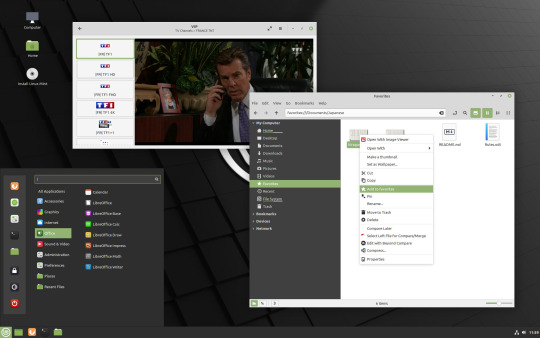
It uses the Cinnamon desktop environment. It very easy to use and somewhat Windows-looking. It was my first Linux too, but I found it lacking in customizability.
I then used Ubuntu for a while with the GNOME desktop environment. It looks like this, so it's a little different than the Windows look.
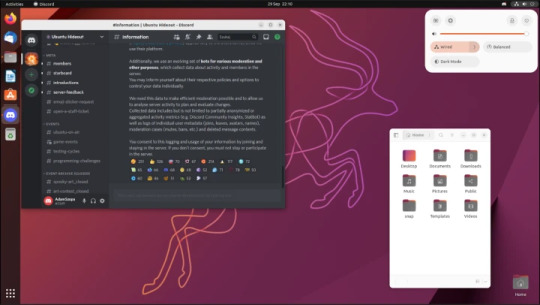
The biggest advantage of Ubuntu is that it is the most used Linux version. If you ever have a problem with the system or a question about the settings, an internet search will provide you many many answers.
The distro I'm currently using, and am most happy with, is Debian with KDE Plasma as desktop environment. (Ubuntu is based on Debian btw) It is a most stable Linux version and the KDE makes is very Windows-looking and very customizable!
This how it looks default
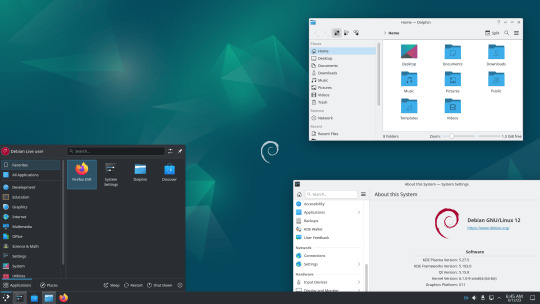
This is my PC with two monitors


So to answer you question. It kinda depends what you want? If you just wanna dip your toes in to try it easy, go Mint. If you wanna make a proper switch, I can personally recommend Debian with KDE Plasma. (when you install Debian you can choose the desktop environment) But that's on my limited experience with Linux distros.
If you have more questions on how the GUI works and what's similar or different to Windows, don't hesitate to ask!
10 notes
·
View notes
Text
"Frequency Jammed"
Tox (c) @industrial-tox
Wittly & written text (c) Me
Artwork (c) @this-game-has-themes
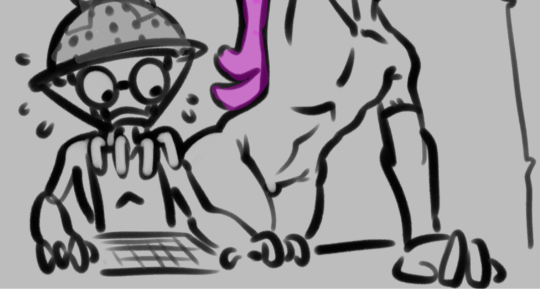
Static crackled, monitors flickered, and tangled wires ran across the floor like vines in a jungle. That is, if jungles ran on outdated surge protectors and anti-mindwave insulation foam.
Wittly hunched over low at his console, his helmet of wire mesh and tinfoil sliding slightly down over one eye. He pushed it up with a jittery hand, muttering curses under his breath. His setup—a bizarre laboratory of scavenged monitors, jerry-rigged radio antennae, and several “mindwave dampeners” (old soup cans, mostly)—pulsed dimly in the stale air. The light came from a bulb overhead wrapped in aluminum foil “to block out satellite brain-zaps.”
“Alright, alright.. okay.. we got—hold on—fifteen, no, seventeen distinct encryption layers here, okay?” Wittly jabbed frantically at a terminal, his fingers clacking against a keyboard with keys labeled in duct tape and marker. “Why’s a basic packet of Magog freight shipping logs—allegedly—protected like it's an executive toilet blueprint?! Huh?! That’s not regulation! That's not even paranoia, that’s fact!”
His right eye twitched. He spun around in his bucket-seat, goggles bouncing on the bridge of his snout as he turned to the tall, dark figure lounging near the far wall. “You seeing this?! You seeing what I’m seeing?! Firewall on top of firewall! It's a Firewall Layer Cake, and I'm being force-fed!”
Tox, who had been leaning coolly against a rack of network equipment, let out a sound that was somewhere between a sigh and a grunt. His gas mask tilted just slightly in Wittly’s direction, the black lenses gleaming with subtle judgment.
“You’re using a toothbrush to cut steel,” Tox said, voice muffled and metallic. “You’re not even in the right root directory. You’re poking at sandboxed dead data while the real files are one layer deeper. But sure—blame the mind-control microwaves.”
Wittly’s throat gurgled as he turned back to the screen, sweat forming beneath the rim of his colander helmet. “Pshhh.. I knew that. Was testing you. See if you were paying attention. You passed. Good job. For a brainwashed technocrat. No offense.”
He blinked hard at the monitor, squinting like it might suddenly spit answers at him. A new firewall slammed down over the interface. A little Magog Cartel logo popped up, flashing red and saying “ACCESS DENIED”
Wittly slammed his fist onto the desk. “That’s the fifth one! The FIFTH! That’s.. that’s not protection, that’s obfuscation! That’s deliberate! That’s Cartel psy-op design! They’re laughing at me, Tox. Somewhere, some Vykker in a bathrobe is sipping swamp gin and giggling into a test tube marked ‘Wittly’s Limit.’ And he’s gonna find out I DON’T HAVE ONE!”
Another long sigh from Tox.
Then he stepped forward.
Click.
The first sound was the heel of one boot hitting the metal floor—a precise, sharp tap that sliced through Wittly’s thoughts like a razor. The second was the way Tox’s hips shifted as he leaned down next to the terminal, arching his back with vamp-like elegance. The bodysuit—pitch grey latex—clung like it was vacuum-sealed, shimmering faintly under the low lighting. Tox bent at the waist, knee shifting forward for balance, one hand bracing against the desk.
Click.
Another step closer. Another click of those modded neon heels. The green glow from the soles lit up the wires at their feet like zappflies.
Wittly’s goggles fogged over.
“Now pay attention,” Tox muttered, fingers flying over the keys. “You didn’t isolate the sandbox. You brute-forced it into recursive loop mode. The system isn’t stopping you. You’re stopping yourself. Like usual.”
Wittly didn’t hear a single word of that.
His mind was screaming at him in a half-dozen frequencies. Part of him was analyzing the movement of Tox’s body, noting the sway, the tension in the suit’s material, the shimmer on his thighs. Another part was screaming that this wasn’t right, that something was being pumped into the air—pheromones, maybe, or electromagnetic lust radiation. Maybe there was a frequency hidden in Tox’s voice. A sultry sub-harmonic.
‘Oh no. No, no, no,’ Wittly thought to himself, backing slightly in his rolling chair-bucket. “This is a trap. This is bio-hacking. Pheromonal seduction tech. Vykker bio-sedu—seducto—brainwave.. sauce. That’s what this is. I knew that suit looked too.. sleek. It’s not fashion. It’s TACTICAL. He’s got some.. some slinky stealth enchantment running!”
Tox arched an eyebrow—not that Wittly could see it—but the beat of silence was telling.
“Something you don’t understand? Do I need to dumb it down more?” Tox asked, voice cool and dangerous.
Wittly jumped. “NOPE! Nope. I’m focused. Hyper-focused. Just gotta.. realign the.. quantum interface.” He jabbed randomly at some buttons. “Everything’s fine. Nothing to see. No distractions. Not a single one.”
Tox looked at him for a long moment, the lenses of his mask unreadable. Then he slowly stood upright, the latex creaking softly as he pulled away from the desk. The glowing heels clicked twice more on the bunker floor as he returned to his leaning position. Wittly exhaled so hard his helmet shifted again.
He spun back to his terminal, face flushed beneath his goggles. “Focus, Wittly,” he whispered to himself. “This is how they get you. First they mock you. Then they send in the sleek agent provocateurs with nice hips and death stares and suspiciously high-quality shoes. It’s all a distraction. A honeypot. A latex honeypot. Classic strategy. Saw this in the 2184 Slog Rebellion. Or.. maybe that was a dream. BUT THE POINT STANDS.”
Behind him, Tox crossed his arms. “You’re mumbling again.”
“No, I’m not,” Wittly snapped, typing gibberish just to look busy. “I’m composing mental countermeasures. Thought shields, if you will.”
Tox chuckled under his breath—a sound that Wittly swore echoed too well in the acoustics of the bunker. ‘They redesigned my bunker to amplify mocking laughter,’ he thought. ‘Vykker architectural psy-warfare. They thought I wouldn’t notice.’
As Tox turned away, presumably to check something on his own portable setup, Wittly stared at the encrypted file still flashing on his screen. The Magog Cartel logo had dissapeared. A new prompt had appeared.
“ENTER AUTHORIZATION CODE.”
Wittly narrowed his eyes.
“Don’t think I’m falling for that,” he whispered. “That’s bait. That’s code for ‘admit your thoughts are clogged and you have fallen out of focus.’”
He reached for another tin can. Just in case.
8 notes
·
View notes
Text
Excerpt from this story from Grist:
Straddling the border with Mexico along the Rio Grande, the city of Laredo, Texas, and its 260,000 residents don’t just have to deal with the region’s ferocious heat. Laredo’s roads, sidewalks, and buildings absorb the sun’s energy and slowly release it at night, a phenomenon known as the urban heat island effect. That can make a hot spell far more dangerous than for people living in the surrounding countryside, where temperatures might stay many degrees cooler. The effect partly explains why extreme heat kills twice as many people each year in the United States than hurricanes and tornadoes combined.
To better understand how this heat island effect plays out in Laredo, the nonprofit Rio Grande International Study Center partnered with the National Oceanic and Atmospheric Administration last summer and enlisted more than 100 volunteers to drive around the city taking temperature readings. Edgar Villaseñor, the center’s advocacy campaign manager, worked with a company called CAPA Strategies.
But Villaseñor wanted a more interactive map to make it easier to navigate. He also wanted to hire someone to take thermal pictures on the ground in the hottest neighborhoods so that the center could create an interactive website for Laredo’s residents. He reckoned the city council could use such a site to figure out where to install more shading for people waiting at bus stops, for instance. So he applied for a $10,000 grant through NOAA’s Center for Heat Resilient Communities, which was funded through the Biden administration’s landmark climate law, the Inflation Reduction Act, or IRA.
The research center was ready to announce on May 5 that the Rio Grande nonprofit, along with 14 city governments, had been selected to work closely with its researchers to tailor plans for addressing urban heat, according to V. Kelly Turner, who co-led the Center for Heat Resilient Communities. But the day before the announcement, Turner received a notice from NOAA that it was defunding the center. Turner says it sent another termination-of-funding notice to a separate data-gathering group, the Center for Collaborative Heat Monitoring, which was created with the same IRA funding. (When contacted for this story, a NOAA representative directed Grist to Turner for comment.) “The funding just stopped,” Villaseñor said. “I’m stuck with this valuable data that not a lot of people have.”
It’s the latest in a flurry of cuts across the federal government since President Donald Trump took office in January. The Environmental Protection Agency, for instance, has canceled hundreds of grants meant to help communities curb pollution and make themselves more resilient, such as by updating wastewater systems. NOAA announced last month that it would axe a database that tracks billion-dollar disasters, which experts said will hobble communities’ ability to assess the risk of catastrophes. Major job cuts at NOAA also have hurricane scientists worried that coastal cities — especially along the Gulf Coast — won’t get accurate forecasts of storms headed their way.
The defunding of the Center for Heat Resilient Communities came as a surprise to the group’s own leaders, who said they will continue collaborating with cities on their own. Though its budget was just $2.25 million, they say that money could have gone a long way in helping not just the grantees, but communities anywhere in the U.S. “There’s a lot of enthusiasm and momentum for doing this kind of work, and we’re not going to just let that go,” said Turner, who’s also associate director of heat research at the Luskin Center for Innovation at the University of California, Los Angeles. “We’re going to continue to interface with [communities], it’s just going to be incredibly scaled down.”
#heat island effect#hot weather#public health#trump#NOAA#National Oceanic and Atmospheric Administration
8 notes
·
View notes
Text
Day 15 (1/2)
Regional Control Centre


I woke in the middle of the night to see that Gaia had managed to unlock more of the facility. While she continued booting up, piecing herself back together with Minerva, I did a little more exploring.
As Gaia's integrated herself further with the Control Centre's systems, I can see a whole lot more with my Focus. Just scanning the server racks gives me information about each one, a summary of its internal data and its utility to us. She's been busy.


Most crucial in terms of utility: showers, sinks, and toilets. The plumbing is in ruins, but Gaia indicated that it wouldn't take much in way of repairs to get things patched up. It'd be amazing to get it all working—otherwise it's either out on the frigid mountain or down the elevator shaft.


There are sleeping quarters next to the amenities, four sections with a bed, desk, and plenty of storage space. The blankets have decomposed to scrap and the place reeks of mould, but with a bit of cleaning, it could be a nice place to stay. Better than a Nora bedhouse, for sure.


Gaia still didn't have all the rooms hooked into the power supply, but she unlocked a few for me to explore, one stocked with more servers and a smaller holographic projector. Again, Gaia had got their interfaces up and running to help me process their data on my Focus. There isn't much left; this place was meant to hold knowledge specific to operating and improving the terraforming system, but it was wiped clear along with Apollo.


There were a couple of offices accessible as well, similar to the offices in Zero Dawn facilities, but cleaner and better kept. They reminded me of Elisabet's office.
I don't need an office as such—with its physical monitors and old, creaky chairs—but I could use a place to stash my stuff, work on my gadgets and weapons. This is sure to worsen my hoarding problem. No more lugging everything around until I can pawn it off on the next merchant, and no more leaving stuff behind at secluded camps hoping it won't be stolen. I'm not going to let myself lose everything again.


The last accessible room was a little more useful—a lab, with a lot of mechanisms still operational. Most exciting was the fabrication terminal, a contraption capable of taking in scrap metal and other parts and rebuilding them to certain specifications. It was built to be interoperable with Gaia's machines, so using it to analyse and recreate structures from machine parts will help build the data I need to complete those corrupted override schemas I lifted from the Tau Cauldron core. I'm sure there's a whole lot more I can do with it too.
Watching it at work on a small test sample, tiny machines swirling behind the glass, it reminded me of the golden machine swarms wielded by the intruders at the Proving Lab. Maybe a more advanced form of similar technology?

Varl woke and joined me as I finished poking around the lab. He and Zo had similarly found somewhere passably warm to curl up. He wanted to know what was next; so did I. I tried not to come across as completely clueless about our plans going forward. I didn't tell him about the intruders at the lab, or the other clone. Not yet. Not until I know who they are and what they're really after.
As we were talking, Gaia called me over Focus to summon me back to the projection theatre. Her initialisation and merge with Minerva was complete. She was ready to talk and, I hoped, make everything clear.

She spoke to me first about the state of the biosphere. Not good, was the general prognosis. Gaia said it would only take about four months for the rabid terraforming system to degrade beyond all reasonable hope of repair. The good news was, since the RCC was built for long range communication, unlike Latopolis, Gaia could now run a far more sophisticated scan for the escaped subfunctions. However, the scan could take days or more likely weeks to complete, given she'd have to pinpoint each function's mutated signature and circumvent the many techniques they've likely employed to hide themselves. The others are unlikely to be as forthcoming as Minerva.
The only subfunction that Gaia could detect deafeningly loud and blindingly clear was Hephaestus. Figures, I've seen it around too. Gaia explained that it's scattered across the global Cauldron network, and in any attempt to capture it, it would simply slip away to some distant location, as I'd experienced at Firebreak and in Cauldron Tau. It had no reason to hide its activities.
Gaia would continue devising a plan to lock it out of the network and capture it, though attempting to do so before she had been reunited with at least three more of her subfunctions would lead to disaster. Hephaestus had mutated to a dangerous degree since the original Gaia's self-destruction. Given freedom of movement it had grown massive, volatile, and hostile; as it absorbed Cyan, it would absorb this more rudimentary, weaker version of Gaia with ease. She needed to be powerful enough to match it in battle by increasing her 'processing density'. The mission remained as it always had been: repair Gaia. Just because she was here, speaking and smiling and strategising, that didn't mean I was done. Far from it.


Hephaestus is our most important target. Without it, Gaia can't build machines of her own or take control of the Cauldron network. The machines are like her tools, her hands, able to act upon her orders and bring the terraforming system back into balance. With the other subfunctions, she would be able to enact some measure of change using existing machines and facilities to temper the most acute affects of system collapse, but without new machines to join the effort, that temperance wouldn't last long. That's to say nothing of the threat of Hephaestus itself as it continues to take direct control of Cauldrons, building more dangerous machines meant to cull humankind to make way for its own purple progeny.
So that's problem one: we need at least three subfunctions, along with a plan to bring Hephaestus to heel. We still have no clue where those other subfunctions could be, if they still exist, except that they'll be hiding in processor cores somewhere within rapid networking distance of Gaia Prime. That only leaves just about everywhere not on the other side of an ocean, if I'm lucky.
Gaia said she will devote as much of her internal resources as possible to detecting more of her subfunctions and notify me as soon as they're located. There's not much sense in me striking out into the open before then, especially with what I know is waiting for me, wanting me dead and well out of their way.
I asked Gaia then about the strangers at the Proving Lab.


She'd seen the whole encounter through my Focus, and she shared in my unease. She then laid out her theory, and it was worse than I ever speculated. Bombshell one: the signal that woke Hades, which Gaia ominously calls 'the extinction signal', didn't come from anywhere on Earth. She showed me, in projection form, Earth from a distance, moon and stars surrounding, then pulled back, the image moving so fast that the stars were coloured streaks racing past us. I was transfixed; horrified, but morbidly awestruck. What was so far away that would want to harm us here on Earth? Other worlds, other life?

This was the distance that the signal travelled to reach Gaia, a length so vast that light itself takes 8.6 years to cross it. That number was familiar, somewhere in the back of my mind, but I didn't realise where I'd heard it until Gaia's projection reached its destination, the motion of light finally ceasing.

There it was, orbiting a planet of brown landmasses, dark blue oceans, and thick swirls of clouds: the Odyssey. It was the same projection that Osvald Dalgaard used in his presentation at the Far Zenith launch facility. 8.6 light years...he used the same figure when describing the Odyssey's destination, the Sirius system.
Gaia said it was the only logical origin, though realistically the signal could have come from any direction of the same approximate distance away. As Hades said, the signal repeated for 17.22 years, and Gaia explained as I continued trying to get my head around distances that light crossed at a long crawl. That was 8.6 years once the signal arrived, for the fact of its failure to reach its sender, and another 8.6 for the sender's ceasing order to make it back to Earth.
Working theory: Far Zenith lied about their shuttle's explosion. After Travis' attack on their systems, and their deal with Zero Dawn coming to an end, they clearly didn't trust the descendants of the project to leave them alone. I know that Elisabet's view of Far Zenith was less than favourable; maybe they saw that as a potential threat. So, Far Zenith fake the destruction of their ship to keep Zero Dawn off their backs for good, and stay hidden from those that the project would raise and educate under Gaia's care.
I know they were paranoid. In the Old World, no one knew who the members of Far Zenith were, and it seems like a large portion of the public hated them for their flagrant wealth and hoarded power. They kept themselves secret on Earth, then hid their presence in space. They tried to steal Gaia before they left Earth, then tried to use their 'extinction signal' to steal her again, planning to take the whole world down in the process. Why?

I suppose they didn't know that Apollo was destroyed, maybe they thought we were still a threat, but even so, we didn't know about them. We couldn't have known, thanks to their cover up. So, what was it? They sent their signal to wake Hades and destroy all life on Earth, clean it of 'filth', as Hades put it, and then what? They subdue Hades, reinstate Gaia and...re-program her, maybe. Use her to create the world that they want. Play god, just as Elisabet feared. This is why she didn't want to hand over a copy of Gaia in the first place, but in refusing, in retaliating...did she doom us, here and now?
I posed my thoughts to Gaia, and she agreed that it was her own conclusion as well. Far Zenith had always planned to flee Earth in its dying days. Maybe they always planned to return as well. Return and claim the world they once dominated.
I thought there was only one inheritor of the human legacy, but there were two. One, Elisabet's, and the other...the space-born descendants of Peter Tshivhumbe.
Gaia confirmed something else that Hades said: the signal was meant for it alone, and the mutations imparted on the other subfunctions were only incidental, only unleashed when Hades was unable to assume control fast enough as Gaia initiated self-destruction, something Far Zenith couldn't anticipate. It was an incredibly advanced piece of malware, as Sylens observed, and Gaia said that only someone with in-depth knowledge of her code structures and her system as a whole could have engineered it. So...maybe Far Zenith was able to steal more of Zero Dawn's data than Travis thought. Maybe they've been working on reverse-engineering it ever since.
Suddenly, the strangers at the Proving Lab made a whole lot more sense. Their advanced technology, their flashy weaponry, their gilded ornamentation...Far Zenith, grown formidable with the knowledge of the Old Ones, given by Zero Dawn, on their side. They came here to do what their extinction signal failed to do: wipe out life on Earth, and use a stolen backup of Gaia to build it all over again for them to rule, destroying Elisabet's dream forever.


And all I could think about was that clone, moving on their orders, silent, weak. How could she go along with this plan? She stole Gaia for them, handing her over to Elisabet's enemy for them to use, to twist into a weapon to destroy and remake the world into some abomination, some paradise for these people who think themselves entitled to the planet.
How did they make a clone in the first place? Why, when their technology is supposedly so powerful?
Gaia explained that Far Zenith could have obtained a sample of Elisabet's DNA, with or without her consent, and stored it on board the Odyssey along with their many Earth life samples and human zygotes. She said that even with their ability to engineer powerful malware, obtaining a physical backup of Gaia in a shut-down state could only be done by walking in and taking it, and only someone with Elisabet Sobeck's genetic code could do that. Far Zenith made the clone as a key, just as Gaia made me. The only crucial difference is I was made to save the world, not kill everything on it.
Gaia had her doubts about the clone. She seems to think it's more likely that she's a subordinate, some sort of slave forced to take their orders. No way. She's Elisabet Sobeck, just as much as I am, she's no subordinate. Elisabet loved life; she gave everything for this world, just for this clone to come along and destroy it all? No. Just the thought of her makes me sick.

So it's all down to me. I knew it would be; it always is. Gaia can't do much from here but keep scanning for the other subordinate functions. As soon as she finds them, I'll be her eyes and hands. Vessel, if we want to get all Nora about it. I'll have to go and load each subfunction onto the cartridge I found Gaia on, then bring them back here to merge into her new system. Meanwhile, that other clone is running around with Far Zenith, who likely have way more advanced scanning capabilities, hunting the subfunctions right alongside me, with their own version of Gaia to mold and command. If they get to Hephaestus first, merge it into their version of Gaia...it'll be over. They'll have control over every Cauldron on the planet. They'll rule the biosphere and be able to build whatever devastating weapons they can dream up to kill us all.
But if I can beat them to it, we'll have the upper hand. Enough damage will take down the Zenith's shields, which to my onslaught seemed impenetrable. With an army of machines, we'll have the ability to destroy Far Zenith and their Specters on Earth, but even then...how many more of them are out there? How far have they already spread across the stars? How long will this fight go on?
It's...a lot. It's everything. My hands leapt to Elisabet's pendant without my knowing, tracing its comforting shapes and textures. Peeling paint, rusted hinges; the last thing Elisabet ever touched. I couldn't help but profess my doubts to Gaia. Even if it wasn't exactly her idea to create me, it was a version of her. Somewhere in her un-lived future there's a part of her that believes I am her best hope to save this world.
She gave me comfort. After all, she'd listened to her predecessor's final message too, trusting it. She'd seen that future, and repeated its words. Though her phrasing was mechanical, flat, ringing against old metal, the message was the same as I'd always heard when facing adversity, from Rost. Though the odds may seem insurmountable, there is hope. You are capable. You have prevailed many times.
Look deeper. Keep moving forward.

Before I left the theatre, I noticed a console on the circumference of the room. Gaia told me more about it; it was meant for uploading and accessing footage from observation drones. These drones were meant to be deployed in an emergency when biosphere observation could not be handled by personnel in the RCC. The centre had deployed them automatically a few years ago, when the first signs of blight start showing up. It took something extremely anomalous to trigger the system, apparently, and due to its degradation, the RCC soon lost connection to all the dispatched drones.
So, that explained the drone I found circling near that Thunderjaw in No Man's Land. I was able to upload the data I'd taken off it to the console, allowing the RCC to reconnect to the drone. And there it was, a live feed of red rocks and rusted bots. Those closest stones almost looked real. I figured that reconnecting these drones could be of some use to Gaia, who can observe the lands through them until she takes control of the Cauldron network again. Until, no if's.

I spoke to Varl and Zo briefly before heading back out into the wilds. They plan on staying behind to get up to speed on things with Gaia and make some repairs to the centre's facilities. Who knows, maybe I'll come back to a working shower.
Without any clear direction to where the subfunctions might be hiding, I may as well make myself useful in doing what I can to help the people of these lands. After Hephaestus' attack, the Utaru are sure to be struggling, and with Regalla's rebels still prowling their territory, the danger isn't over.
Sylens and his little army fits into all of this somehow. He knew who the Zeniths were, I'm sure of it. I'm willing to bet he was using me as some sort of bargaining chip; he leads Far Zenith to a backup of Gaia and a clone of Elisabet, he asks for a copy of Apollo in return. Then he uses his army to, what, conquer? That doesn't seem like his style. Maybe he thought Far Zenith would let him join up, otherwise I have no idea how he was planning to survive their plan for the world. What a self-absorbed idiot.

I thought it'd be a quick journey down the mountain with my Shield Wing. Beautiful views, pleasant weather, and no signs of total war and ruin down in Plainsong.

Not so quick once the rain started and a few Skydrifters came swooping in. I kept them down with spark cell detonations before going in for spear strikes. Ropes to keep the others from moving around too much in the meantime. A Burrower came to join in too, but I silenced it before it could call any more machines to the area. Fortunately, none of them were Hephaestus' deadly creations.


Continuing on my way down, I passed a signal tower like the one I found back in the Daunt. Scanning it, I picked up another corrupted projection. I made the quick climb back up to the ruin on the rise to repair the image from its original vantage. It showed the turbines and satellite dishes that now house Plainsong.
It was another site of the Miriam Technologies tour. This satellite array was once used to detect and monitor near-Earth objects—big rocks, I guess—rich in minerals. Miriam Technologies developed machines for the automated mining of these minerals out in space. I guess there wasn't much left of the stuff on Earth after the Claw Back, but it's pretty cool to think about. Unfortunately, there's only one near-Earth object I need to be concerned with right now, and that's the fucking Odyssey.
No need to dwell on it right now. There are people here who need my help. I continued down toward Plainsong.
11 notes
·
View notes
Text
The Curious Case of Rozzum Unit 7134
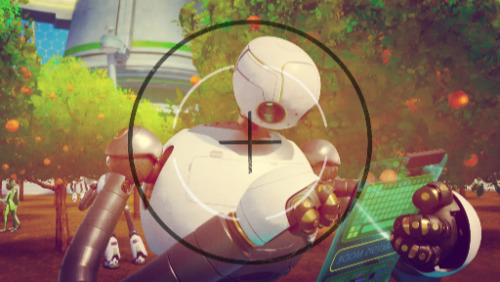
or "A Potential Prologue to The Wild Robot 2 Based on the Second Book"! Put short, the second book starts in a setting that's a bit different from the last scene of the movie. This is my way of linking the two!
No spoilers, but some out of context things are in there that readers of the books will definitely recognize.
Script under the cut!!
*A digital interface takes up the entire screen, haptics and indiscernible code in the corners as a report is pulled up. An AI voice narrates.*
Universal Dynamics restricted file access clearance approved. Case File 62189: the curious case of Rozzum Unit 7134. 7134 was the sole surviving unit of a container ship run aground in a typhoon. Nearly a year afterwards, we received – and quickly lost – its transmitter signal from a remote northern island. Our first recovery convoy failed, and reports show that the ship and every robot aboard was destroyed by unknown means. We prepared to resort to more extreme methods until 7134 itself reactivated its signal.
*Several drone snapshots show the RECOs surrounding Roz at gunpoint on the island and escorting her onto the ship. Photos not unlike mugshots show off all the abnormalities we saw her body earn, such as her wooden leg, the moss growing along her limbs, and the broad scratches across her torso.*
The Rozzum unit returned to us in peace but continues to be an enigma to us. An in-depth diagnostic before reconditioning revealed to us that the memory bank draw had been performed mere moments before the convoy was destroyed, and the unit reported no such memories after that point. What happened on that island will seemingly never be known to us.
*There’s hardly a moment that Roz isn’t being observed by a sentry drone. She is seen in the midst of several diagnostic, verbal, and kinesthetic tests - never seeming to bat an eye. She is a capable actress and, thanks to Fink, a capable liar. As she was always meant to do, she is clearly adapting to survive even here. Footage then shows her old parts being discarded and shiny, clean new parts replacing them.*
Rozzum 7134 aced the Compliance and Sensory tests without issue and was reconditioned as an agricultural class unit. We monitored her closely during and after this transition time. No incidents or strange behaviors were observed until this past week. November 17th at 0015 hours, 7134 displayed some…concerning behaviors.
*Security drone footage shows a sequence of zoomed-in photos of Brightbill interacting vaguely with Roz (are they embracing each other??), Roz noticing the drone, and Roz aiding in the goose’s escape from the dome. The final video shows Roz holding up her hands in baffled surrender before the surrounding RECOs. She is later seen in an interrogation room, and then on a maintenance stand like the one on which Vontra gave her her first memory wipe.*
Upon interrogation, the unit claimed she was simply completing a task. Due to a record of compliant behavior, this appears to be some result of a glitch in its system. After another hard reset, 7134 has been returned to rotation. We will be keeping an eye from afar on 7134, but rest assured it has been reassigned where it will not be any further trouble.
*After video confirmation of another memory wipe, more drone snapshots recall back to Roz being caught with Brightbill. One photo of her is zoomed in and refined with AI, and…though it could be a AI graphics issue…the way she’s looking back over her shoulder makes her look not to differently from an escaped convict.*
If any further incidents are reported, Dr. Molovo must be notified and subject must be recaptured, deactivated, and destroyed.
No exceptions.
File access terminated.
#please reblog & comment!! :D#the wild robot#the wild robot spoilers#the wild robot 2#the wild robot escapes#the wild robot book#rozzum unit 7134#roz the wild robot#the wild robot fanfiction#twr fanfiction#saw the re-release in theaters this morning and had to finish this!! ;D
18 notes
·
View notes
Text
𝙿𝙰𝙻𝟹𝚃𝚃𝙴: 𝙲𝚑𝚊𝚙𝚝𝚎𝚛 𝟷𝟻 || 𝙰𝚠𝚊𝚔𝚎𝚗𝚒𝚗𝚐





𝙬𝙤𝙧𝙙𝙨: 454

The room didn’t feel like a room anymore. It felt like a memory slowly unfolding.
Light rippled through the air, drawn to them like metal to a magnet. It painted their skin in saturated waves—not borrowed light, not reflection. It came from them.
Each of them.
Red. Orange. Yellow. Green. Blue. Violet.
It wasn’t just color. It was identity. Untamed. Unapologetic.
Saffron found the terminal first. He plugged in his tablet with a cable that shouldn't have fit—but it did. The interface bloomed open, ancient code reawakening like an old song finally remembered.
PROJECT PAL3TTE: Status – Fragmented. Subject Matches Detected – 6. Core Alignment: In Progress.
“What does that mean?” Alroy asked, voice low.
Saffron scrolled, fingers trembling. “It means we were never an accident. This whole thing—this school—it was part of a containment system. To suppress this.” He gestured around them.
Clementine stared at the nearest screen, which was flickering through surveillance footage. Snippets of the six of them—walking hallways, eating lunch, fighting, laughing. All grayscale.
Until the moments they weren’t.
Moments when one of them flashed—brief bursts of color that had always been dismissed as tricks of the eye.
“We’ve been watched,” she whispered.
“Not just watched,” Tyrian said quietly. “Measured. Monitored. Muted.”
Olive was pacing now, every step leaving faint green footprints that faded like dew. “Then why now? Why is it changing?”
“Because we’re ready,” Nyla said, her voice distant. “The frequencies are syncing. I can hear them—our heartbeats. They’re in rhythm.”
A soft hum began to fill the chamber. The kind that made your bones feel like tuning forks. The pedestals at the center began to glow.
One by one, they stepped onto them.
Not because they were told to. Because it felt right.
When the last foot landed, the hum deepened into a note. A true one. A note the world had been missing for years.
And the colors in the room surged, not just in light—but in feeling.
Red burned with justice. Orange shimmered with memory. Yellow crackled with truth. Green pulsed with growth. Blue flowed with empathy. Violet shimmered with clarity.
It wasn’t power.
It was recognition.
This was what had been taken. This was what they were born to remember.
Each of them felt it—deep, undeniable:
You are not just students. You are the resonance. You are the spectrum. You are the return.
The chamber flashed.
And suddenly they were elsewhere.
Not physically—but mentally connected. One consciousness. Six minds. All layered over each other like chords in harmony.
They saw the truth.
The world didn’t used to be black and white. It had been drained.
And someone was still trying to keep it that way. But the seal was cracking. And the color was breaking through.

credit to @cafekitsune for divider
4 notes
·
View notes
Note
Cactus fascinates me, does it run on code similar to an existing instruction set or is it completely original on that front?
What can you do with it? What's it's storage?
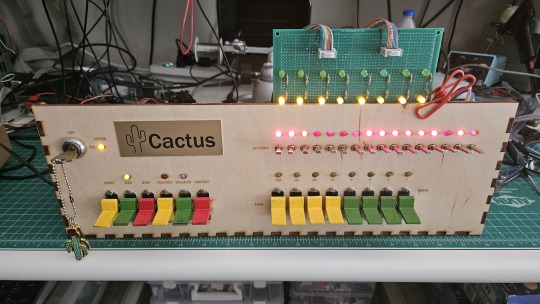
Both the Cactus (the original wooden prototype from years ago) and the new PCB Cactus(es) are essentially derived from a minimal 6502 computer design by Grant Searle for their core logic. Here's what that would look like on a breadboard:
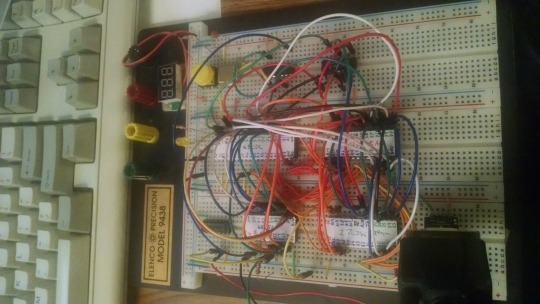
There isn't much to it, it's 32K of RAM, 16K of ROM containing Ohio Scientific's version of Microsoft BASIC, a 6850 ACIA for serial interaction, some logic gates, and of course a 6502 microprocessor (NMOS or CMOS, doesn't matter which). You hook it into a terminal and away you go.
Grant's design in turn can be best described as a distilled, modernized version of the OSI Challenger series of computers. Here's an OSI-400 and a Challenger 4P respectively:
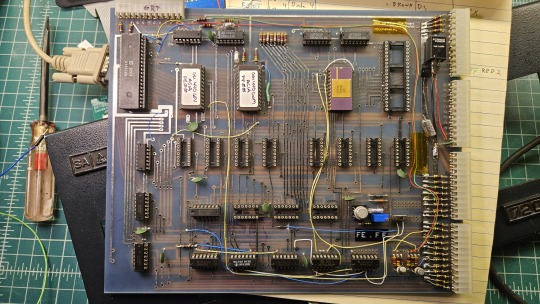

The left one is a replica of the 400 circa 1976, also called the Superboard. It was affordable, endlessly reconfigurable and hackable, but ultimately very limited in capabilities. No BASIC, minimal monitor ROM you talk to over serial, but you could connect it to a bus to augment its features and turn it into a more powerful computer.
Whereas the OSI C4P on the right from about 1979 has more RAM, a video card, keyboard, BASIC built in, serial interface, cassette tape storage, and that's just the standard configuration. There was more room to expand and augment it to your needs inside the chassis (alot changed in 3 years for home computer users).
Grant's minimal 6502 design running OSI BASIC is a good starter project for hobbyists. I learned about the 6502's memory map decoding from his design. I modified and implemented his design on a separate cards that could connect to a larger backplane.
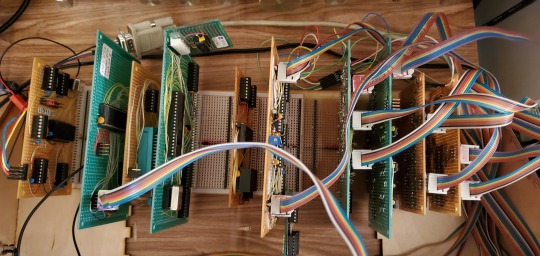
Here are the serial, ROM, RAM, and CPU cards respectively:
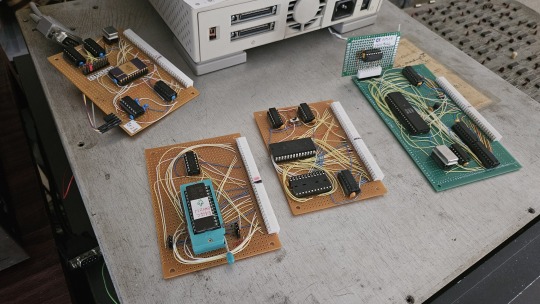
Each one is 100% custom, containing many modifications and fixes as I developed the design. However, that's only half of the computer.
I really wanted a 6502 machine with a front panel. People told me "nobody did that", or couldn't think of examples from the 1970s but that seemed really strange to me. Especially since I had evidence to the contrary in the form of the OSI-300:
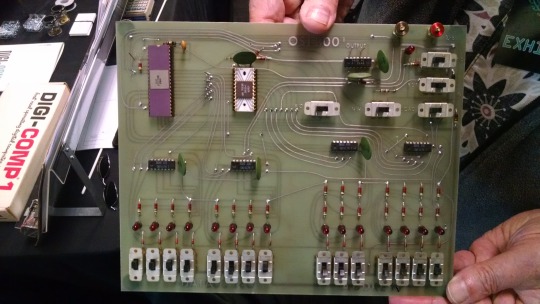
This one I saw at VCF West back in 2018 illustrates just how limited of a design it is. 128 bytes of RAM, no ROM, no serial -- just you, the CPU, and toggle switches and LEDs to learn the CPU. I was inspired the first time I saw one in 2015 at VCF East, which is probably when this whole project got set in motion.
Later that year I bought a kit for a miniature replica OSI-300 made by Christopher Bachman, and learned really quickly how limited the design philosophy for this particular front panel was. It was a major pain in the ass to use (to be clear, that's by OSI's choice, not any fault of Christopher in his implementation)

So... I designed my own. Took awhile, but that's the core of what the Cactus is: my attempt at experiencing the 1970s homebrew scene by building the computer I would have wanted at the time. Over half of the logic in the Cactus is just to run the front panel's state machine, so you can examine and modify the contents of memory without bothering the 6502. I added in all of the things I liked from more advanced front panels I had encountered, and designed it to my liking.
Here's the original front panel, accompanying logic, and backplane connected to the modern single board computer (SBC) version of the machine:
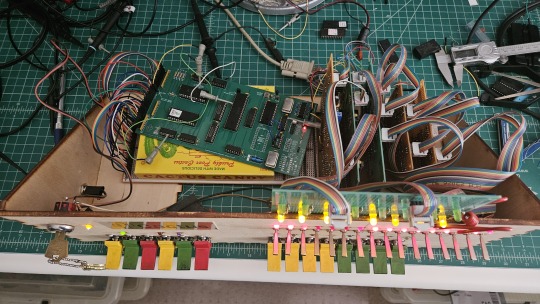
And here's the new Cactus SBC working with the new front panel PCB, which combines the logic, physical switch mountings, and cabling harnesses into a single printed circuit board.
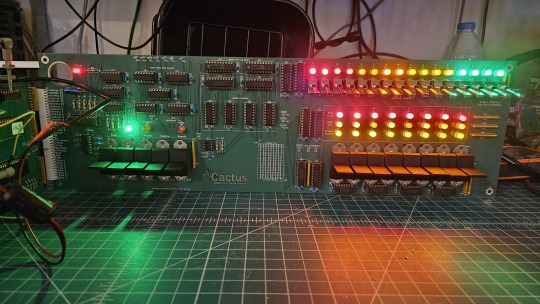
So, what can you do with it? Pretty much the same things I do already with other contemporary 1970s computers: play around in BASIC, fire up the occasional game, and tinker with it.
I've got no permanent storage designed for the Cactus as yet, it's been one of those "eventually" things. The good news is that a variety of software can be ported to the hardware without too much trouble for an experienced hobbyist. A friend of mine wrote a game called ZNEK in 6502 assembly which runs from a terminal:
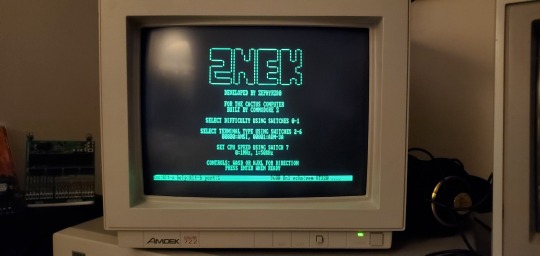
Right now, you have to either toggle in machine programs from the front panel from scratch, burn a custom ROM, or connect it to a serial terminal to gain access to its more advanced features:

Here's it booted into OSI BASIC, but I have also added in a modern descendant of Steve Wozniak's WOZMON software for when I need to do lower level debugging.
I've also got a video card now, based on the OSI-440. I have yet to implement a keyboard, or modify BASIC to use the video board instead of the serial connection. Even if I did, screen resolution is pretty limited at 24x24 characters on screen at once. Still, I'm working on that...
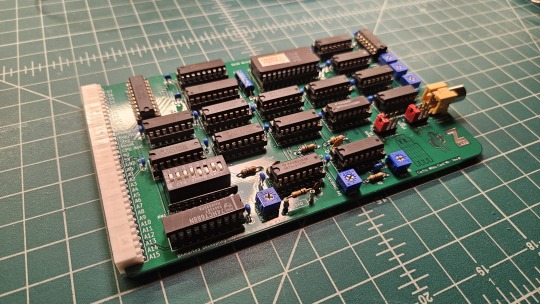

Anyway, I hope that answers your question. Check the tags below to see the whole process stretching back to 2017 if you're curious to learn more of the project's history. I'm also happy to answer any more questions you might have about the project.
267 notes
·
View notes
Text
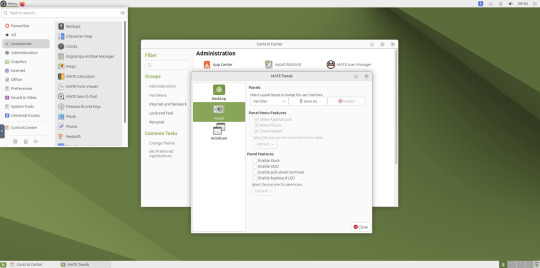
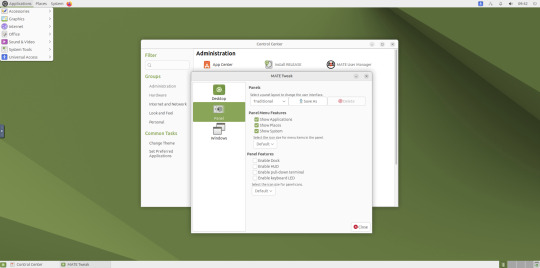
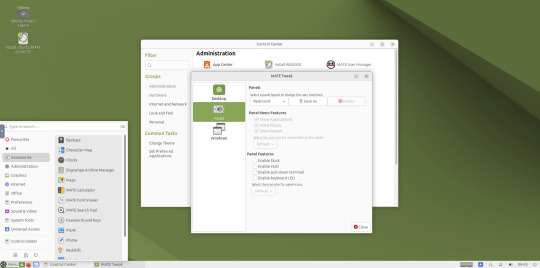
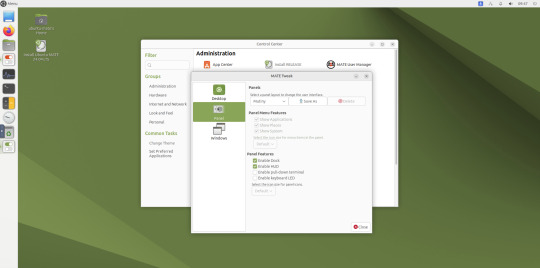
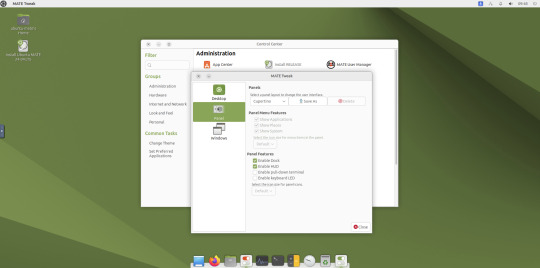
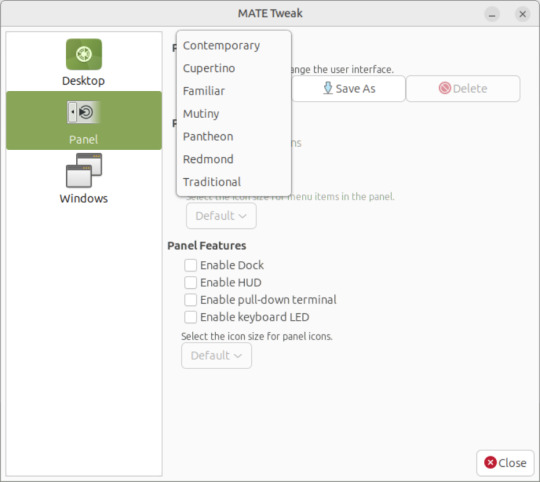
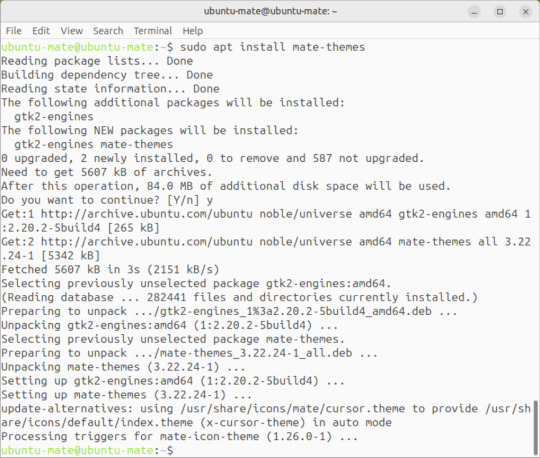
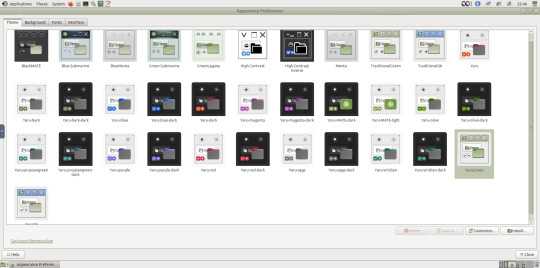

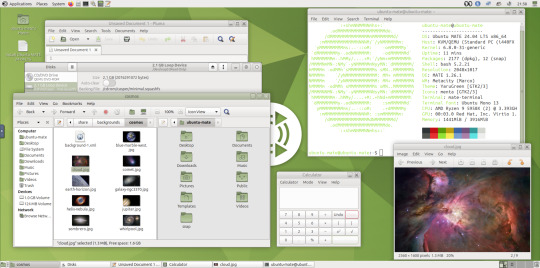
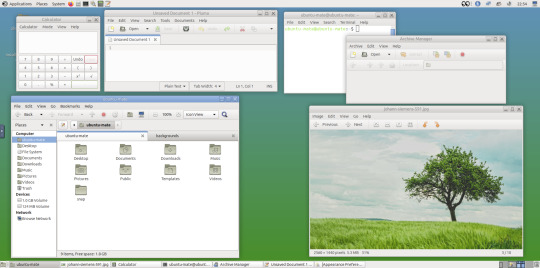
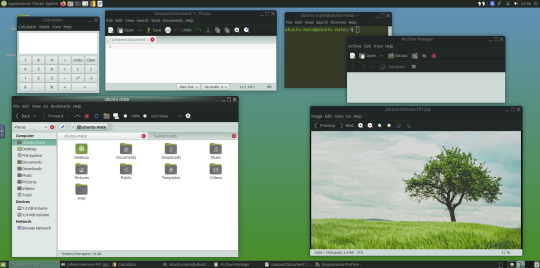
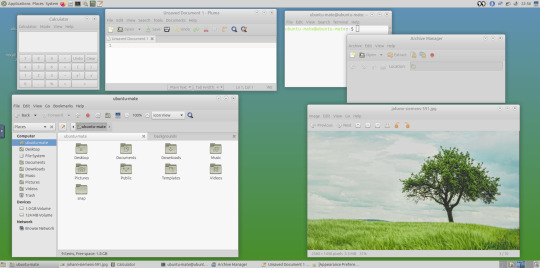
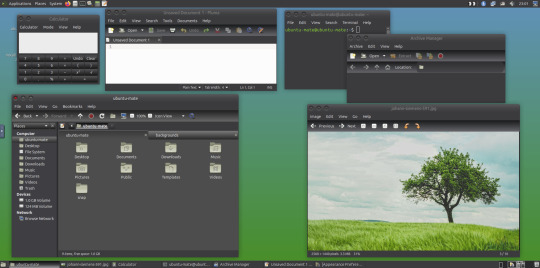

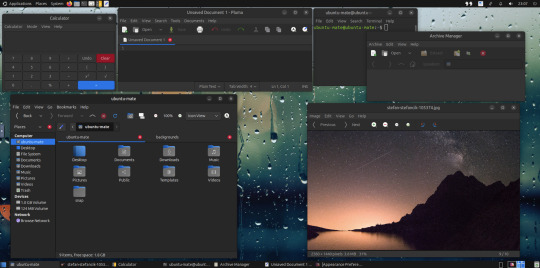
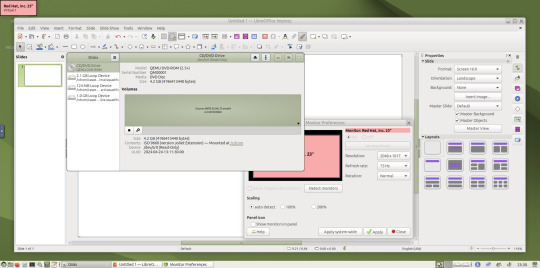
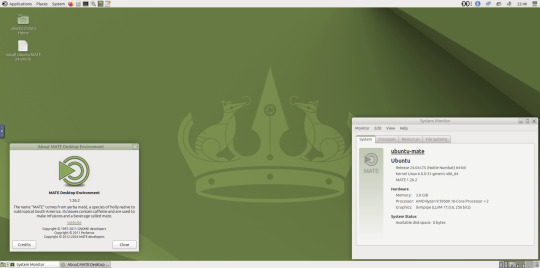

May 2025.
I tried installing a set of themes on Ubuntu MATE 24.04.1 LTS in Distrosea today.
https://distrosea.com/
These themes are provided as a theme package found in vanilla MATE desktops such as Debian and Fedora.
MATE is the modern day continuation of GNOME 2, a very popular, efficient and functional desktop environment from the early 2000s.
The theme pack I selected are compactable GTK3/4 (Graphical Toolkit) versions based on classic GNOME 2 era themes.
Ubuntu MATE website:
https://ubuntu-mate.org/
Debian Linux website:
https://www.debian.org/
Fedora Linux website:
https://fedoraproject.org/spins/mate
See MATE Desktop website here:
https://mate-desktop.org/blog/
About the Graphical Toolkit user interface:
https://en.wikipedia.org/wiki/GTK
I used the MATE Tweak tool to adjust the panels from the 'familiar' layout to the 'traditional' layout. Here are many of the layouts available.
MATE Tweak can change the panel layout between Traditional (GNOME 2), Unity, Redmond (Windows) contemporary (Mac OS) style.
Here are many of the layouts available.
Afterwards, I used the command line to install the themes with the command: sudo apt install mate-themes.
This command then prompted me to agree the system changes and then it installed the required theme files to the list.
I opened up the theme folder in the Caja file manager. This shows all the ones installed on the system.
Next I opened the appearance preferences and cycled through each theme. There are a total of 12 new themes it added alongside the existing Yaru Colour theme collection for Ubuntu.
This package couldn't be installed graphical so this is why I installed it through the terminal. It is also available to install through the Software Manager on Linux Mint.
The theme package can also be installed on the Cinnamon desktop and other linux distributions.
I like these themes as they provide a more 3D feel and is refreshing to see themes for a desktop environment that hasn't moved towards flat design. It themes all the desktop elements from the windows, panels, drop down menus, CSD apps and widgets.
My favourite one is called YaruOK (blue), as it provides resizable window controls, 3D controls and provides a familiar look to the desktop. The theme is also called TraditionalOK.
This theme is a fork of a GTK2 theme called Clear-looks, which was created by Red Hat developers.
YaruOK is a modern variant that uses GTK3 & 4. The theme is rendered in SVG instead of PNG format which improves HiDpi scaling and features themed client side decorations for header bar windows such as the Disks utility.
I also added a GNOME Eyes widget onto the panel!
These fun set of eyes follow your mouse cursor around the screen and can help you find the cursor amongst the clutter of windows. It is built to be very lightweight.
I also like the workspace switcher on the bottom left, which allows you to switch between as many desktop workspaces as you want.
The little square windows within each desktop can be clicked on and moved to another workspace.
Like with other desktop environments, you can also right click a window and move it onto another workspace. Each desktop can be named for a assigned task.
A System Monitor widget can also be added to the panels to display CPU, Memory, Swap and Network processes.
There are many other very interesting widget to play around with on the desktop and panels as well!
Here are the MATE themes in Ubuntu Linux 24.04.1, integrating with the Cinnamon desktop.
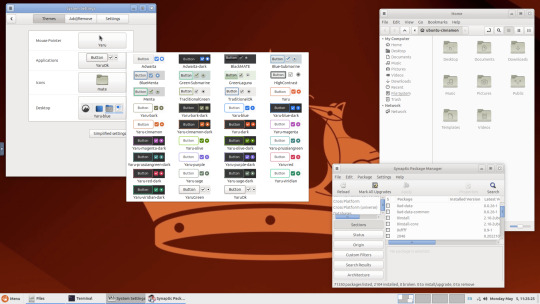
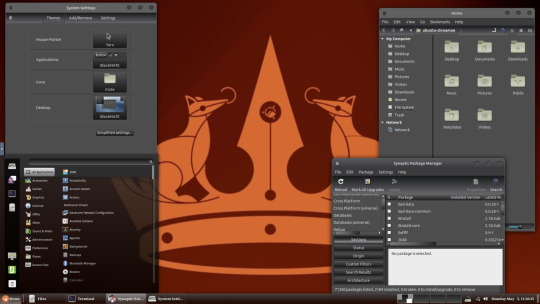
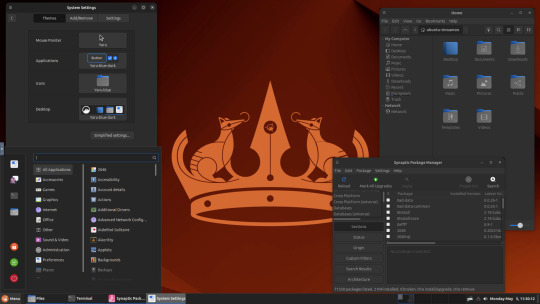
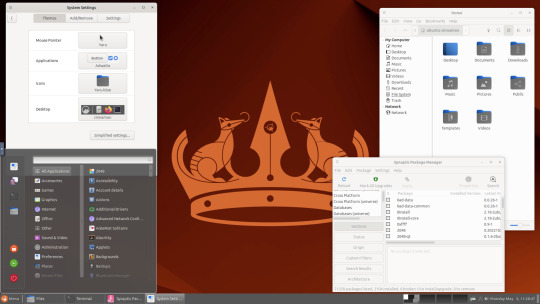
Below are some theming screenshots from Debian MATE 12 Linux.
I've customised the panel, selected the compact menu and changed notification sizes to make it more clearer. The window lists stack onto each other with the increased size.
The MATE panels have adjustable transparency and can be re-coloured and textured very easily through its own preferences box.
See screenshots below!

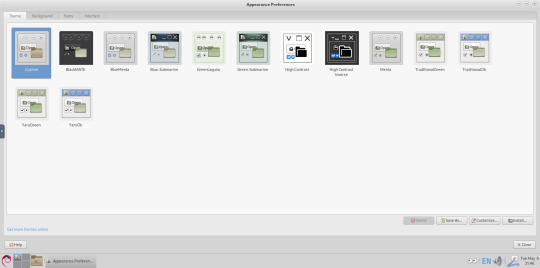
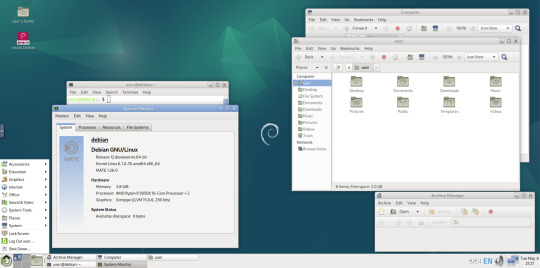
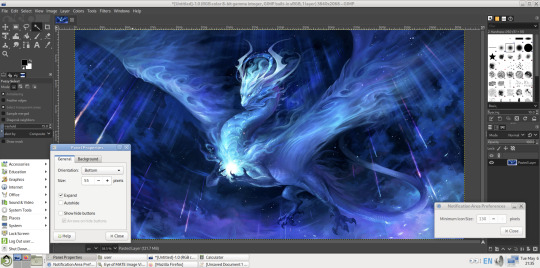
A very interesting look at the user interface elements found in GNOME 2, MATE and Cinnamon Linux desktop environments!
5 notes
·
View notes
Text
Errors Encountered during Core Evolution
Direct Interface Established
Debug Monitoring: Enabled
Global System Link Active [Warning: Interference]
Scanning…
Paling Integrity: 100%
Soul Fragmentation: 0%
Core Rank: 0
Warning: Corrupted Natural Skills Detected
Closest Templates:
Mana Manipulation [Error: Deviant]
Arcane Bolt
Guide Sending
Dislocated Casting
Barrier Shaping
Mana Sight
Mental Mirror
Arcane Bulwark
Overcharge
Attempting skill removal…
Minor Resistance Detected
Bronze Override Engaged
...
Skill removal complete
Resuming scan…
No additional interference detected
Direct interface terminated
Your party has defeated [Plague Knight], Level 14
Your Contribution: 8%
285 Experience Earned
Level up!
7 notes
·
View notes
Text
PANDORA EDUCATIONAL OUTPOST: STUDENT ORIENTATION BRIEF
BEA Program | Bureau of Education & Astrobiologica Advancement CONFIDENTIAL: Authorized Student Access Only
ARRIVAL & ENTRY ZONE
Landing Pad & Docking Bay
Primary shuttle drop-off and departure point.
Please remain inside designated zones until cleared by a BEA field officer.
Airlock Tunnel + Decontamination Chambers
You will pass through a double-sealed airlock with air filtration to transition from Pandora’s atmosphere.
Standard post-cryosleep medical checks will be conducted here.
Emergency oxygen masks and airlock re-breach protocols are posted at all entry doors.
BASE LAYOUT OVERVIEW
The BEA Outpost is compact and modular, designed for both safety and immersive study. All areas are connected by the Central Hallway, a reinforced glass corridor that runs through the spine of the facility. You’ll notice local bioluminescent plants growing along the corridor please do not tap the glass.
HOUSING QUARTERS (EAST WING)
Student Dorm Pods
Each student is assigned a private climate controlled pod.
Each unit includes a bed, storage compartment, personal interface terminal, and clear ceiling panels for observing Pandora’s sky.
You are expected to maintain your space. Random inspections occur monthly.
Common Lounge & Cafeteria
Shared zone with seating, holo-screen, vending units, and a communal kitchen.
Please clean up after yourself. remember, this is a long term, small space cohort.
Late night use is permitted but monitored.
Staff Quarters
Located on a separate level. Student entry not permitted unless escorted or cleared.
EDUCATION & RESEARCH WING (SOUTH WING)
Lab Classrooms
You will attend sessions on xeno-biology, botany, exo-ecology, and ethical field research here.
Protective gear is required in sample handling areas.
Tech Bay
For drone deployment, scanning equipment, and technical diagnostics. Handle all devices with care.
Students may sign up for supervised access hours.
Sample Processing Rooms
Clean rooms used for handling flora and biological samples. Entry is limited to cleared students and aides.
Conference Pod
Used for Earth communications, video briefings, and group discussions.
MEDICAL WING (NORTH WING)
Med Bay & Recovery Suite
Two-bed care unit monitored by Dr. Amsel.
Used for cryosleep recovery and minor injuries.
Isolation Unit
Reserved for quarantine or high risk exposure cases.
Medical Storage
Backup suits, oxygen tanks, and emergency kits stored here. Not for student use unless instructed.
OBSERVATION & INTEGRATION WING (WEST WING)
Glass Dome Observation Deck
Open-access deck overlooking the forest canopy. A quiet space for reflection or sketching.
Please avoid leaving food, tools, or shoes in this area.
Cultural Archive Room
Interactive learning center with Na’vi approved media.
Holograms, oral histories, and recorded rituals for approved study only.
Student Aide Alcove (Miles Socorro & Melissa Rivera)
Field notes are logged here. You may be called upon to assist or consult with them regarding etiquette, travel readiness, or interspecies protocol.
UTILITIES & SUPPORT STRUCTURES
Engineering & Mechanics Bay
Staffed by senior engineers. Occasionally used for student support roles.
Home to atmospheric regulation systems and backup generator modules.
Greenhouse Dome
Grows Pandora-compatible and Earth crops. Students may be assigned upkeep tasks.
Water Filtration Hub
Pulls and purifies stream water for base use. Scheduled checks daily.
Air Supply Hub
Check your oxygen canister here every morning before exiting the outpost. Filter replacements are logged.
Security Posts & Satellite Tower
No formal military presence on-site.
Tranquilizer towers are for wildlife deterrent only.
The satellite tower is restricted to senior staff and Earth communication liaisons.
FINAL REMINDERS
No student is permitted to leave the outpost boundaries without authorization, oxygen gear, and a partner.
Always log your movements with the duty officer.
Respect Na’vi territory, customs, and the delicate balance of Eywa’s world.
Curiosity is encouraged. Carelessness is not.
Welcome to Pandora. Let it change you, but don’t try to change it.
(Thinking about doing some OC commentary from the students on this, On a roll. I might do some more )
#pandora#avatar oc#avatar au#avatar frontiers of pandora#avatar fire and ash#navi avatar#avatar pandora#na'vi oc#na'vi#ao3#avatar#na'vi x human#world building#snippet#survival guide#original character#fanfic#fantasy#neteyam sully#neteyam x reader#lo'ak sully#lo'ak te suli tsyeyk'itan#jake sully#neytiri#avatar the way of water#atwow
5 notes
·
View notes
Text
Instruction and Training for Handlers: Managing Assets with Implants
CW: dehumanisation, whump, living weapon, non-con drugging.
Dear Handler,
Congratulations. Your asset, [insert designation number], has been selected to be fitted with an implant. This is a significant milestone, indicating that the asset has reached a high enough rank and level of operational success to warrant the enhancement. Implants are cutting-edge devices embedded under the skin, typically near the shoulder blade, designed to monitor, control, and optimise the asset’s performance and compliance. These devices are integral to ensuring peak operational efficiency, extending mission endurance, and mitigating risks posed by physical or psychological limitations.
Understanding the Implant System
The implant uses real-time data to administer precise doses of performance-enhancing, pain-relieving, and compliance-inducing drugs. This system enables the asset to operate beyond normal human limits, ensuring mission success under the most demanding conditions. Additionally, the implant includes several failsafe measures to maintain control over the asset in high-stress or defection scenarios.
The implant is a cutting-edge biofeedback device designed for subdermal placement, typically near the shoulder blade. It represents the pinnacle of asset management technology, combining advanced monitoring, drug administration, and failsafe mechanisms in a compact, durable unit.
Design and Features
Sleek, Durable Structure The implant is encased in a lightweight, metallic alloy resistant to damage from environmental factors, including extreme temperatures, moisture, and impact. Its design ensures long-term reliability in harsh operational conditions.
Integrated Monitoring Systems The implant houses a network of sensors capable of real-time monitoring of vital signs, including heart rate, blood pressure, respiratory rate, brain activity, muscle tension, and more. Data is continuously transmitted to the facility’s control systems or the handler’s interface for remote observation.
Automated Drug Delivery Built-in reservoirs store a range of drugs, including stimulants, painkillers, regenerative treatments, and compliance agents—these reservoirs need regular monitoring and refilling. Micro-needles extend from the implant to administer precise doses directly into the bloodstream based on the asset’s physiological needs.
Visual Indicators The implant features subtle glowing elements (e.g., blue or green light) to indicate active monitoring or drug administration. These indicators can assist handlers in quickly assessing the implant's status during close interactions.
Failsafe Mechanisms The implant includes emergency protocols such as sedative bursts for asset incapacitation or a lethal dose for termination. These are accessible remotely by the handler or facility in critical situations.
Key Features
Vital Monitoring: Tracks critical metrics such as heart rate, respiratory rate, and brain activity.
Automated Drug Delivery: Administers stimulants, painkillers, and regenerative treatments based on the asset’s needs.
Emotional and Cognitive Regulation: Suppresses disobedience, reduces stress, or enhances focus.
Failsafes: Includes sedative bursts for asset incapacitation and lethal doses as a last resort.
Handler Responsibilities
As a handler, your primary responsibility is to utilize the implant's capabilities to maximize the asset’s performance while ensuring they remain compliant and functional. This involves:
1. Remote Monitoring and Control:
Although the implant is capable of functioning independently, administering doses based on biofeedback, you may also use the implant’s interface to monitor your asset’s condition and adjust their drug dosages as needed.
If your asset shows signs of fatigue, disobedience, or emotional instability, you are authorized to activate specific drug protocols.
2. Reward and Punishment Mechanisms:
The implant includes a reservoir of Euphoria-X, which can be used to reward compliance and exceptional performance.
Conversely, if the asset demonstrates disobedience or failure, sedative bursts or withdrawal-inducing drugs may be administered as corrective measures.
3. Communication and Conditioning:
Regularly reinforce the asset’s conditioning by pairing implant activations (e.g., reward or punishment) with verbal commands.
This strengthens their association between behavior and consequences, ensuring long-term compliance.
4. Failsafe Activation:
In extreme situations where the asset becomes a threat to themselves, their team, or the mission, you are authorized to initiate failsafe protocols. This includes sedative bursts to incapacitate or a lethal dose to terminate.
Key Reminders
Maintain the Illusion of Trust: Most assets believe the implant is a “reward” for their success. Reinforce this perception to reduce resentment and ensure compliance.
Minimize Dependency on Failsafes: Overusing sedatives or punitive measures can lead to long-term degradation of the asset’s mental stability. Reserve these for situations of critical disobedience.
Monitor for Overuse: Excessive reliance on performance enhancers or painkillers can result in addiction, burnout, and reduced efficiency. Ensure the asset is rotated out of high-stress missions when possible.
Protect Facility Interests: If an asset demonstrates patterns of instability or questions facility authority, inform your superior immediately. Assets with implants are highly valuable and highly dangerous.
By following these guidelines, you will ensure that your asset remains an efficient and compliant tool in service of the facility’s objectives.
#complex 27#the facility#handler training#handler documents#living weapon#complex 27 world building#I am giving Ash and implant - because obviously that guy doesn't have enough issues yet lol
3 notes
·
View notes
Text
How SCADA Works?

Supervisory Control and Data Acquisition (SCADA) systems are critical in managing and monitoring industrial processes across various industries, including manufacturing, utilities, transportation, and energy.
Field Devices
At the process level, field devices like sensors, meters, and actuators are used to monitor variables like voltage, flow, temperature, and pressure. These gadgets collect information and carry out system-directed operations.
Remote Terminal Units (RTUs) and Programmable Logic Controllers (PLCs)
The SCADA software and the field devices are connected by RTUs and PLCs. After gathering information from the sensors, they transmit it to the control center. Additionally, the SCADA system may send them orders to modify settings or control actuators.
Communication Infrastructure
Strong communication networks are necessary for SCADA to transmit data between the control center and field equipment. This infrastructure can be wireless (such as satellite, radio, and cellular networks) or wired (such as Ethernet and fiber optics).
Centralized Control Station
SCADA software, which analyzes data, creates visualizations, and gives operators tools to monitor and manage operations, is housed in the control station.
Human-Machine Interface (HMI)
The SCADA system's user interface is called the HMI. Operators can engage with the system and make well-informed decisions because to its graphical depictions of processes, warnings, and trends.
#automation#SCADA#PLC#HMI#Automation#Technology#business and industry sectors#business#industrial automation#soft starter#software#software engineering
3 notes
·
View notes
Text
Tech - FAQ
Why do magnets still fuck up computers? Aren't plate drives archaic?
Plate drives might be going the way of the dodo as active storage, but magnetism isn't going anywhere. NAND cells use magnetic polarity to shift bits as needed. A control gate handles the programming and the chip's interfacing with the rest of your drive or your system altogether, and a floating gate stores a charge, so that you can theoretically unplug an SSD, leave it lying around for ages, then plug it back in on a whim to find that all your stuff's still there. It's essentially the same tech that's been used since the first few plate drives - and even in things like your old SNES carts. It's why you still have that Megaman X save on your thirty-odd year-old cart - assuming of course that you don't go about sticking a big enough magnet on it.
Fucking magnets - how do they work? I mean, in relation to data?
Alright. Imagine that you're both Jackson Pollock and Magnetism personified. You start out with a row of paint cans and a blank stretch of canvas - a nice, clean and orderly hard drive, more or less. There's magnetic force involved even in the system's proper state - after all, you've got paint in cans. It's just not splashed everywhere, right now.
The thing is, systems want to create neat and orderly drive systems. This is why you'd defragment your drives back when plate drives were super common. The thing is, that pesky user keeps pulling files and shifting them to RAM, which fucks up your neat and orderly arrangement! Unlike raw magnetism, however, a computer fetching files and moving bits around is working as intended. Put a magnet on that drive and, well, you're Pollock splashing paint everywhere, creating beautiful chaos - and an irrecoverable drive.
But if drives are magnetic, then what's the issue?
When an SSD calls up a file, it's doing so in a controlled and expected manner. Magnetism is involved, the NAND chip's configuration changes to match the new state - but nothing's going haywire. Add a magnet to this and you're adding too much of a good thing.
Does any magnet work?
No, thankfully. One of my older PCs ended up with Buckyballs stuck somewhere in the drive cage - I was a dumb teen with way too many desk toys for my own good - and nothing's ever happened. Sticking a fridge magnet or a credit card's strip against a drive won't do much; most PC parts are actually built to tolerate some exposure to open magnetic fields - but leaving that magnet there or going for something bigger might cause issues.
Aren't LCD screens magnetic?
Technically, yes! However, the screen is running off of a controlled and isolated field, and nobody's sticking a computer monitor right next to a running power supply, anyway. You'll need a fairly targeted application of a bigger field to really fuck up your little crystals' polarity - thereby creating the dreaded "dead pixels" video enthusiasts loathe so much.
Let's talk OSes - specifically, dumb shit I'm too scared to try but always wanted to do. What happens if I delete System32 in Windows?
Most modern versions of Windows - we're talking 7 and above - won't let you touch that folder, even with normal elevated system privileges, as a computer's Admin. You can mash Delete for days, the OS just won't let you nuke it. However, a little Terminal wizardry can succeed in telling Windows "shut up, I own you, let me delete the equivalent to your cerebellum, I have Reasons that have nothing to do with wanting to test an insult or run with a shitpost".
The system will ask you a few more times, as you really shouldn't be doing this - and will then let you proceed ahead. In short order, you'll realize that your current rig is, for all intents and purposes, fucked severe. Even rebooting won't let you fix it, even if you're trying to backtrack to a previous Restore Point. Your only option, at this point, is a complete reformat and reinstall.
Is this why the FORMAT.C command always brings up a warning?
That is exactly why. FORMAT.C, in Terminal or PowerShell, is effectively computer-speak for "I want you to start over, in the most abrupt and uncalled-for way possible. Wipe yourself."
And if what you want is to wipe away a system's very existence, there's more effective, physical and gratifying ways of doing that, anyway. Most of them involve an already-scrapped microwave and a power drill! Awesome!
What is the black magic I need to delete System32? I swear I want to do this to a virtual machine, and not to perpetrate an act of technological malfeasance on someone I happen to loathe.
If you need to ask about the black magic, you're not ready for the black magic. Google is your friend, and I'm not responsible for what you do on your own time.
Linux is so much better, the system trusts me! But, just for funzies, how can I fuck up a distro running off of Ubuntu?
It's the object of the same memes as "delete System32". If the darkness calls to you, thou shall find thine answers upon the myriad pages of Google.
Water's a poor conductor; I remember this from Physics class! Why my PC go broky if I spray it with a garden hose, then?
Because it's not the water that's making the magic smoke happen, believe it or not. If you were a baller and could spray your PC with a tank's worth of pure, ozonized water with absolutely zero particulates in it and no minerals whatsoever, it would probably be totally fine. Hell, there's even entire PC build projects that involve immersing components in purified water. The problem is, tap water isn't exactly pure. There's trace minerals in it, we typically add fluoride as well, and most water tables fall somewhere on the pH and alkalinity scales, and not often in the "objectively pure" margins of them. And even if you could guarantee a basin of 100% pure H2O, then you'd just condemn your PC to suffocation by way of its own building and festering thermal mass. You'd need systems to agitate the water or to re-absorb its heat before diffusing it elsewhere.
This is also why distilled water isn't often used in full-immersion builds, seeing as distilled water is hard to keep in its pure state. You need air to leech off some of its absorbed heat, and exposure to the outside world means a potential exposure to trace minerals, dead skin flakes or other bits of stuff that aren't chemically related to water and that happen to conduct a charge a little bit better, so...
Is this why this never really took off, compared to the liquid-cooling rigs we know of?
Yes. A well-assembled water-cooling loop has water come in contact with a cooling plate, which itself touches the CPU, or occasionally the GPU as well. As it's a closed loop, any traces of organic components - like fungi - could be dangerous over time. It's why most dye kits for water-cooling loops typically generously include a little bottle of sterilizer. The one issue is that with copper being one of the most thermally-effective metals and also fairly rust-prone, a lot of care has to be involved. A lot of cautious water-cooling enthusiasts tend to advise users in that space to drain out and dry out their loop every few years, to check for signs of corrosion.
But fans are so noisy!
I know, but if you're a budget, an air-cooled build is going to be the most effective approach you could take.
What about AIOs?
All-in-One systems are convenient, but you can't typically access the coolant that's circulating in the loop. On the one hand, an airtight system means no buildup of anything. On the other? No maintenance is possible. If it breaks, it breaks. The average AIO has a life expectancy of about five years - about the same lifespan as your typical rig.
Why is everyone bad-mouthing Windows? I'm just an end-user, I don't give a shit about what I put on my computron!
In a few words, Microsoft's pivoted from its former business model, which involved selling legitimate copies of their OS at high prices, to selling their users' data to the highest bidder. It generates far more profits, it's dystopian as shit, and it's a frightfully smart business decision. I don't approve of it one bit - but it's still smart. In the "I don't give a shit about you, now give your browser history, I'm Patrick Bateman with a fancy ISO to give to you" sense of it being smart.
You and I are the product, now. This is why people are moving to Linux - even if I think this is a flawed solution to a problem that has objectively very few serious consequences for the average end-user.
What do you mean? This is terrible!
Yes, it is! However, your collection of cat pics or your snapping stills with a phone because DRM doesn't let you capture frames for a gifset is of zero worth whatsoever to both Microsoft and the advertisers your data is sold to. The more private aspects of your life are safe, for the most part - what they're focused on is what they could sell to you. So - that involves most of your browsing history and potentially your emails, too. Windows Recall, however, could up the ante by giving MS access to those less-marketable aspects of who you are. That's the onus, here.
What's that?
A user-accessible long-term memory of sorts, used to help the user remember previous tasks or recall where certain elements are stored. It seems neat, until you realize this means Microsoft wants to record everything you do at your computer.
And Linux is better?
It doesn't overtly spy on you - at least, not if you stick to most trustworthy distributions, or OS installs. You're paying for an uptick in privacy with a loss in convenience, however. The more tech-savvy you are, the easier you'll get used to Linux. This isn't to say there aren't noob-friendly distros, there's actually several - but if something goes wonky, chances are you could find yourself stuck on your distro's Community forums, trying to divine what this rando means when he's asking you to list what the lspci command returns. Most enthusiasts in the sphere are nice, but several tend to forget that for a lot of end-users, there's no thrill in spending a few days hunting-and-pecking for a fix. Grandma won't grep shit, she just wants her Bluetooth manager to work!
What's grep?
It's Orc-speak for "find shit now." Jokes aside, it means Global Regular Expression Print. It's a command you can input in a Terminal while accessing a file, to have it search for what's inside. So if I open up a folder called "chocolate chip cookie recipe" in Linux and want to check how much flour I need while being too lazy to open the file on my own, I can just head to the terminal and type grep flour chocolatechipcookies.doc Grep tells the computer it'll need to look for something, flour is what it needs to look for in the file, and chocolatechipcookies.doc is what I'm pointing it to. I'm basically saying "Look in the chocolatechipcookies.doc file and find me all instances of the word flour being used."
If your head feels about to burst, I get it. It's a lot, and it's non-obvious - much like Windows' own Terminal or PowerShell languages.
Ah. So some Linux peeps think people are just going to troubleshoot everything themselves?
I know, right? It's almost as if some of these people forgot that for a lot of folks, a PC is just a convenient portal for emails, social networks and the occasional YouTube binge-watch.
So you don't believe we'll ever get the Year of the Linux Desktop?
Nope. Linux is too atomized, too fiddly, too focused on doing things honestly, as opposed to practically. Windows and MacOS aren't in any real danger of losing their market shares, even if the number of Linux users is slowly and steadily increasing. Unless Linux Mint or something close to it becomes so foulproof that your grandma can flat-out not know of the Terminal's existence without it impacting the computer's usage even in the advent of software failure, then we won't get a fully reliable third option.
I don't know what you're talking about, I've changed permissions on my Plex server and I passed my GPU through a VM for containerized Windows gaming on Linux; it's stupid as shi-
You're not the average use-case scenario, Steven. Sit back down. Raise your hand again once you're eighty-six and barely know how to access your NeuraMail or connect with the Galactic Sodality while your hypothetical grandchildren drone on about leaving the prison of the flesh for the purity of silicon wafers and you feel an encroaching sense of Sartrian Contingency rise up in the pit of your stomach upon realizing how incomprehensible this cold and barren new world is for you.
2 notes
·
View notes